#I will be real with you she’s mostly just a plot device with no real backstory or lore
Text

Got inspired to actually come up with a design for Yamilet!
The character master post has been updated!
#kirby#hoshi no kirby#kirby right back at ya#art#kirby art#kirby oc#kirby of the stars#kirby au#digital artist#kirby wolfbell au#yamilet#it only occurred to me after drawing her her telekinesis fluids look like Minecraft EXP particles#she’s actually just 2828228 Minecraft exp points in a trench coat#I will be real with you she’s mostly just a plot device with no real backstory or lore#all I know is she’s a bitch#so it would be really really fun to flesh her out more and do more with her
16 notes
·
View notes
Text
fr both taylor's quants as mirrors to themself. rian Seen as so meritous and deserving and talked to and tasked with and advised and considered but apparently rian's whole thing is going "huh. wha" and having wendy's level of self-reflection (none). winston who is begrudgingly allowed to sit in his corner and ignored b/c he's undeserving so he can't really be meritous and nobody would look in that mirror b/c it's gonna be So not their reflection. while he just won't stop cassandraing and having all these insights and perception and observations nobody even asked or told him to have and is peak taylor understander and just like taylor: isn't guided by a paper-thin ego but also will take criticism / blame / mistreatment Too Much for his own good
#winston billions#the tragedy of the Lose Lose imbalanced [rian is ostensibly a character but actually a plot device] [winston: ostensible plot device but#actually a character] like yknow we could even some of this out a little. but also once again billions' handling of Gender Things....#that's (mostly) all an issue on rian's side of the Quants Who Are Also You scales#(it's also ofc still relevant re: winston; or anyone; and especially wrt Autistic Character but that's gonna be beyond billions)#(even [society if nonbinary rian] aside like. thinking you simply have one of your rare Cis Women Characters here....come on)#give rian a little more of that '''''worse''''' treatment that would let her be more Funny Little Guy as lets winston be more characterful#even transcending the [they won't give him an arc or C plot that's actually about him or anything] limitations#meanwhile again like Lmfao rian was Meant to be important but that's Only meant taking part in Other People's Plots as [device]#being a plot device is a way to use characters it's not like Inherently Bad but like lmao. rian doesn't get to do anything herself For Real#AND all the plot devicery means she's never gotten to have consistent enough motivations or like. traits to be An Character.#winston's writing is so [here he is to do little a expositing. butt of the joke. minor plot device] that he has way more room to like#just be idiosyncratic & Not have that yanked around by ''prominence''....it happens to All billions characters but it's So bad w/rian#like i can go ''this feels like it's Too Far serving the plot or conflict at the expense of character'' other times w/other roles but like#that'll then also be isolated enough to just ignore. w/rian it's like spent that whole time doing multivariable calculus waiting on more#info more context to conclude anything abt what she's even Basically supposed to be like. even my more generous theories can't hold up#and based on precedent i don't have much hope that remaining [i guess this could be a quality of hers] will either (a) not be contradicted#or (b) get to actually mean anything in any of her arcs which ig now get to be about the [nothing] that is [pay disrespects]#winston isn't bound to get a real arc even last minute but he'll still have felt like more of a character#rian doomed by intending ''importance'' from the start & that they don't seem to have ever had the idea of any more solid foundation#and that billions going ''gender; huh?'' can be like. rian has to go away now; we needed her vagania for diluted cishet man sex scandal#well i for one am really reflecting on Women In The Workplace(tm) now & for what. rian funnier littler guy winston Ever getting a C plot...#a superior tmc timeline....and like as ever rian can be shitty that'd be fine. but if it Means Nothing b/c billions either goes [nuh uh]#and/or b/c either way it just does Nothing with it. that then Is Not character material for her; it more so is For Winston suffering it....#most likely to end with billions just agreeing rian Was so specially meritous & deserving & winston was too cringefail (autistic) to live#even if we get anything Alright / given consideration & care in his material....which will in turn be like eh. as ever; will take it lol#plus ofc fascinating like. can't draw a hard line b/w the Writing & the Performance but still wondering how much of winston's idiosyncrasy#and that sense of character is big time via will's acting. definitely got that foundation in that the Writing = quant kid 2; one-off joke#and the Performance of that material = furiously writing in multiple winston scenes & despite it all bringing him all the way into s7#but he's autistic & typecast so also our hands are tied. could've had more for Either/Both quants; which = more for taylor by extension. f
3 notes
·
View notes
Text
ALPHA TROLLS RANKED BY HOW WRONG THE FANDOM AT LARGE IS ABOUT THEM:
This is a personal challenge, based entirely on my own experience and perspective, and also ranked from Most to Least Correct. I was bored, and thought this might be fun.
Putting this under a cut, because it's long as hell.
MEULIN LEIJON
People get her mostly correct, from what I’ve seen… Most of the time, fan content of Meulin is absolutely recognizable as Meulin, but her pride in her deafness + joy of learning new ways to interact with the world through/due to her disability is always removed, and I do not often see people tackle the Toxic Positivity aspect of her character. That seems less like character assassination, though, and more like a combination of people not actually playing through the Openbounds, people not being able to fathom disabled people (especially those who gained a disability later in life rather than being born disabled) being happy, and general fandom distaste for the idea of touching anything uncomfortable, especially when that uncomfortable topic is highly mundane, normalized, and potentially applicable to them or their loved ones. Meulin’s toxic positivity was, of course, commentary on Tumblr’s ecosystem at the time, so… It was much harder to touch back then.
ARANEA SERKET
People tend to get her general, broad strokes personality right, but unfortunately she gets treated pretty roughly for the crime of Being A Serket. People refuse to understand her motivations, and she often gets demonized for what she was doing around/during [S] Game Over, even though that was something she’d gotten pushed to and also was cool as fuck to watch. God forbid a woman do anything.
DAMARA MEGIDO
People are right about the racism, 100%. It is completely despicable, hard to look at, and extremely blatant. She does, however, have character outside of that. No, it isn’t “whore”, it’s more like “angry, dysfunctional abuse victim”, and she’s genuinely a very interesting and tragic character. But, again, people are right about the racism, so she gets to be placed way up here.
MEENAH PEIXES
She is such a chaotic little bastard. I love her. I really do. Please understand that she genuinely does not understand the concept of consequences. This girl didn’t have a Lusus, she didn’t have parents, it was functionally illegal to tell her “No, you can’t do that.” That would fuck up literally anyone’s moral compass. That’s not me hand waving away all the fucked up and bad shit she’s done, we all know what she did, but people tend to forget this aspect of her character and it pains me deeply, because it is a very genuinely interesting concept that I want to see more of. She’s capable of regret, we’ve seen her feel it, I just don’t think foresight is her forte. No one raised her to consider consequences, or help her experience them in a healthy way, because nobody raised her period.
Also, her ass is not butch, she is the girliest girl in the entire comic. She is about hot pink and glitter and kiss marks and unicorns and cute little puns and you will respect that. She is not masculine. Her ass is not masculine nor is she butch. Let her be her hyper-feminine self.
LATULA PYROPE
Please for the love of god there is more to her character than “Gamer Girl” and “Mituna’s Girlfriend”. You are falling for her fucking ruse. Please. Please. Please recognize that her entire character is about internalized misogyny, and being forced to overcompensate for misogyny in gaming circles as a gamer who happens to be a woman. Please. I’m begging.
KURLOZ MAKARA
His character is not that deep, it’s mostly just a string of events he is mysteriously, inexplicably involved with. The Makaras are extremely Function Over Form- their characters practically do not exist, they're mostly just plot devices that exist to push the story along. I'm sorry to Makara fans. You just invented a guy in your mind and decided he was real.
He is also not that soft, though, and his relationships with both Meulin AND Mituna are not healthy. Hard to stop people from ascribing cutesy squishy lovey dynamics to random men who happened to have looked at each other once, though. Some people truly haven't graduated from 2012.
HORUSS ZAHHAK
I am begging people to consider that maybe the biggest issue here is not that he is “Bad Otherkin/Therian Representation” and is in fact maybe the fact that Hussie was actually making fun of Systems when he was writing Horuss. Because Horuss is canonically a system. He uses the word system. He uses the word switching. He uses the word host. He literally talks about his Plurality at length in extremely upfront, plain terms. I don’t know how him being “Bad Otherkin Representation” was and still is the main discourse about him. It makes me insane. That is a commentary that truly writes itself. Talk about having your priorities out of wack, honestly...
PORRIM MARYAM
No, she is not a MRA, she’s just a regular feminist who happens to live on a different planet with different politics and social hierarchies from Our Real World Earth’s USA. Whatever argument you’re about to pull out of your ass to say that she sucks is bad. She already explained what she meant by that, in more detail, very clearly, and she was right. Half the time she’s literally just giving you factual information about what Beforus was like, and literal plot synopses. She isn’t saying anything insane. She’s literally normal. I don’t know why people cannot handle or process this. Porrim has not ever said anything controversial. If you disagree with this you’re either misconstruing her on purpose or you fell for Kankri’s bait, and that’s just fucking sad at that point.
Also, she’s more than a sex object, and her tits are not huge. Honestly, half the shit she was saying was just “I am more than my sex life”, and so many people took that and made her main character trait her sex life. Just pathetic.
RUFIOH NITRAM
This man is a fucking war criminal and I will stop at nothing until he is behind bars for his crimes against Damara. Raging misogynist. Total fucking cunt. Just the worst. If I talk any more about this, this part will be 1,000 paragraphs long.
But also, I’m begging people to recognize his relationship with disability, too. He was similar to Meulin in the sense that he didn’t mind his disability, and his biggest gripe with it was the way that Horuss tried to “fix” it… Which is an interesting way to expand upon how Beforus’s culling system is not only very explicitly ableist, but mimicking real world systemic ableism. I also want people to recognize that Hussie is actively having a conversation about the reclamation of slurs with Rufioh’s character, and how not letting people reclaim such language is doing nothing but giving the word power against them while stripping away their own personal agency.
Rufioh’s a complicated guy, and he’s interesting and also the worst, and I am really tired of how he gets watered down to nothing but “Pretty Boy Victim Of His Inexplicably Psycho Ex”.
MITUNA CAPTOR
Holy Fucking Shit, You Guys Are Ableist.
KANKRI VANTAS
To this day I see people saying he was just Hussie making fun of SJWs. To this day. To this day people think Hussie was trying to make Every Tumblr Leftist look bad, and that he hates them Because They Are Leftists. When will people recognize him as a bootlicker to the oppressive class and the violently bigoted. When will people recognize that. When will people recognize that this is more of a commentary on the legitimate real flaws of Tumblr’s politics at the time. When. When.
When will people stop portraying him as a lovey-dovey Catholic Whore. I’m going to stab my fucking eyes out and then kill everyone in this building. Me when it's based and cool to ship an aroace character with a sexual predator. I GUESS.
CRONUS AMPORA
I say this with every ounce of sincerity I can possibly muster as a person: What the literal actual fuck.
#homestuck#homestuck fandom#alpha trolls#beforan trolls#dancestors#damara megido#rufioh nitram#mituna captor#kankri vantas#meulin leijon#porrim maryam#latula pyrope#aranea serket#horuss zahhak#kurloz makara#cronus ampora#meenah peixes#nekro.pdf#nekro.txt
587 notes
·
View notes
Note
for the ask game: 🧡🖤💚
🧡: What is a popular (serious) theory you disagree with?
Until I see definitive proof that Ludinus is in fact as old as he wants people to believe he is, I will not believe it. I don't even really have an opinion on how old he is; I just don't think he's as old as he tries to suggest. And lest it be said that I am playing favorites, the thing about Ludinus is that he talks the way Essek talks in 91—and there are a lot of things Essek says at that dinner that I take with a good heaping of salt. It's this sense that they're talking around things that they would rather people not question; they're both very skilled at talking around things in a way where they aren't outright lying, but they'd rather you not think too hard about it because there's shit they're not saying. To be clear I also won't be mad if there does turn out to be some evidence in canon that he is that old, but thus far, there is nothing definitive, and I do not take the word of unreliable NPCs at face value.
🖤: Which character is not as morally good as everyone else seems to think?
I don't think this is really an unpopular opinion at this point, but Jester. Nice =/= good. I don't think she's evil, by any means! But her morality is a lot more complex than it's given credit for and I think it's one of the things that is most interesting about her. I'd actually consider her largely amoral; it's just not really an axis of consideration that she worries about. She doesn't want people to hurt her or her friends and she doesn't want something to destroy the world, but otherwise she doesn't really care much about what someone's morality is. "Just don't be evil to me" is an incredible sentiment for a reason. She cares more that Essek said they were his friends than the fact that he's the traitor they've been looking for. Ludinus is so insignificant to her despite his literally world-spanning evil plots that she has basically forgotten him six years later, even though two members of her friend group have spent the last six years trying to pin him down. Jester is hilariously amoral and I love that for her.
💚: What does everyone else get wrong about your favorite character?
[cracks knuckles] OKAY, this is where I've got receipts, because hooo boy do I have an opinion and I will be proving it.
Essek does not have an opinion on the Prime Deities. He does not really have much of an opinion on religion. He actually does not by the end of the campaign have any real issue with the Luxon, and frankly he primarily expressed issue with the Dynasty's worship because, until he got to Aeor, he wasn't certain that the Luxon was a real entity at all—which he contrasts against the Prime Deities, in fact!—and he seems to believe there is compelling evidence in Aeor that categorically disproves his hypothesis that the beacons are simply constructed Age of Arcanum devices.
Originally he is mostly concerned that the Luxon religion is used as a "crutch" which is "distracting them from what other good things they could do with the time and focus". He does specify that any religion can be used as such, but he only remarks upon the one he knows. His theory about the beacons, as of episode 91, is that they may be "artifacts designed in the Age of Arcanum that have been misread" that could be put to even further use.
He also does parrot the Dynasty party line in their first meeting about the Luxon being "the basis of how we've been able to free ourselves from the binds of the lineage the Betrayer Gods left for us", and while I do not take him at face value here (see the above commentary about unreliable NPCs), I doubt the truth of this statement is lost on him, considering his familial connections to Bazzoxan, which I can only imagine would not exactly endear one to the Betrayers, though this is only conjecture. If we do care to take him at his word here, it's not unreasonable, since he obviously has a lot more interest in the power offered by the beacons than anything else.
With all that being said, his tune on the Luxon itself has at least changed by the time they get to Aeor. He discusses iconography found in Aeor and when prompted by the Nein about whether the beacons were created by mortals, says, "I do not believe that they are made by anyone but the Luxon. They are of the Luxon. But they've been around since the Luxon's been in Exandria, which is the beginning."
So we started with him largely apathetic to religion, uncertain if this god was real, and by the time we circle back to him, he has now sided fairly definitively with the fact that the Luxon is an entity that has been around since at least the Founding. (For those keeping track at home, this is longer than Predathos has been around. In the Dynasty's creation myth, it may also have been around before the Prime Deities arrived, which is technically not incompatible with the creation myth of Exandria at large, but I digress.) Like most of Exandria, and as is perfectly reasonable for both his culture and his region, he probably doesn't have any love for the Betrayer Gods, but doesn't express much opinion if any on the Prime Deities. He has no time for religion, but frankly, he doesn't have time for much except for his own research, so it's hard to really ascribe any noted contempt to that.
Like, look, I've written plenty of religious trauma Essek fic, and I don't doubt that that element of it exists, but overall, in terms of canonical statements, it's pretty tame.
With that being said, I do want to fast forward a bit to draw attention to something else. Because I actually do think he ends the campaign with some measure of respect for, at the very least, the Wildmother.
In 140 after the Raise Dead fails, he talks briefly with Fjord about the unfairness of it. Fjord passively directs him to "if you were to ask my wise friend Caduceus..." Immediately after this exchange, Essek challenges Caleb to not accept defeat, and admits he wishes there was more that he or any of them could do, but concedes that, "Unfortunately, this type of magic is beyond my purview."
Immediately after this exchange, Caduceus asks for divine intervention.
Of course, he then spends several weeks gardening in a temple to the Wildmother, and seems to find some genuine clarity and perspective there, but I think this alone is enough to argue that, for a person as driven by empirical evidence as Essek, this sequence of events in 140 would be plenty to earn a wizard's respect.
So my formal belief is that Essek is not in fact anti-god or anti-religion, let alone against the Prime Deities. My opinion is that it's very easy to imagine him on his post-campaign travels leaving a small offering at any shrine of Melora he might pass, not out of actual worship but as a sign of respect.
#unpopular opinion meme#this got so long and it's late cuz I had to go pull receipts but I am correct on all counts 😤#but since it's long and I did cite my sources I'll also toss it in#cr meta
119 notes
·
View notes
Text
Watching something as iconic as NGE is kinda funny because every now and then something happens and you're like "oh! that guy! from tumblr!"
General thoughts:
Poor Shinji. Dude keeps getting put in situations.
The Ender's Game comparison keeps coming up for me - child soldiers utterly essential to the cause. The big difference is that they are just completely flubbing their psychological management in NGE - in Ender's Game they had eyes on the kids 24/7 and maintained in-depth psychological profiles on all of them, whereas in NGE they have loads of money and manpower focused on maintaining the EVAs but their equally-essential pilots are just... going to school. Shinji got punched and they didn't know!
And what is Misato's deal, anyway? She's in her 20s and has a crazy amount of authority (she just requisitioned all of Japan's power) and they're just kinda... letting her manage Shinji? It's not her job, but she's just doing it? She's his commanding officer but also his mom/sister, which is a really bad combo. Also I don't think I'm imagining the grooming undertones, those seem intentional.
The real motivator for someone like Shinji is (of course) his social connections - the two schoolkids and Rei, and then maybe to some degree Misato, and then even more distantly his father. Kids don't put themselves through severe distress just for the abstract concept of "saving the world," especially a world that has thus far been very unkind to them. To bring back the Ender's Game comparison, this feels like a very deliberate point that Graff and friends were aware of (the way they used Valentine as a strategic resource) but in NGE it seems to be mostly happenstance that Shinji made some human connections before completely shutting down.
Rei thus far is an interesting foil to Shinji. Normally I get kind of put off by scenes like the one where he walks in on her, but it gives you a lot of important information about both of them. Shinji, underneath all the abandonment issues and repression, is still a pretty normal kid - awkward, horny in that embarrassing adolescent way, deeply self-conscious. Rei is alien (or perhaps just very autistic). She just doesn't clock 90% of the tension at all. She pilots the EVA without complaint (though perhaps with equal psychological distress, just heavily repressed). She also gets along very well with his shitass dad, which is revealing in its own way.
I'm told there is another child, a red haired one, named Asuka(?), the thus-far only implied Second Child. Wonder why she isn't here yet?
I heard that it was some kind of twist that the EVAs were alive in some sense, but doesn't that naturally follow from the first couple episodes? Unit 01 moves to save Rei without a pilot and then goes berserk to kill the angel. Maybe there's more to the twist that I don't know yet.
What's up with the angels? Why are they here, what do they want, what are they exactly? Who cares. They are a plot device in purest form - they enable the rest of the show, but the show is not meaningfully "about" them. They didn't half-ass it though - the designs are absolutely phenomenal.
Oh, and there's some second project NERV is working on, a human transformation thing that got mentioned once and never again. That will probably be important eventually.
#i'm doing femmenietzsche's suggestion of watching 6 episode chunks as arcs#finished the first last night#nge#arc 1
70 notes
·
View notes
Text
chapter 159 thoughts!
Chapters Since The 143 Kiss Happened And Went Entirely Unacknowledged And Unaddressed Count: 16
Aqua Hoshigan Status: White
Surprise! As predicted by literally everyone in the fandom, the stab was a fakeout! To the shock of perhaps three people, no, one of the titular Kos of Oshi No fame was not, in fact, dying in an unceremonious cliffhanger stabbing - the only real question was exactly what sort of fakeout it was going to be. I did see quite a few folks suggest 'Akane in a wig and a stabproof vest' even in jest so congrats on calling it! Admittedly this is kind of silly but I would take 'silly' over the character assassination massacre that last chapter's apparent twist would've been any day of the week.
I guess if anything about this reveal surprised me it's that Kana wasn't involved at all…? Unless this is a double fakeout and something's going to happen at her graduation (which is not impossible for reasons we'll get into). Whereas all the buildup for Ruby (seemingly) getting stabbed basically only came in the same chapter it happened in, we've been getting some pretty heavy handed hints that something might happen to Kana for over 60 chapters now if my mental math is right - her parallels to not just Ai and Yura (i.e, our two on-screen victims), language associating her with the "type" we see targeted and that huge "Kana Arima will always protect Ruby Hoshino" red flag dropped by Gotanda, among other things. Kana is also the character who has the most actual direct parallels with Ai, where Ruby is defined mostly in how she differs from Ai… Or at least she does when the story makes sense lol. But I guess we'll see.
Either way, I personally have mixed feelings on Akane's involvement here, in this moment. On the one hand, I like what it represents about Aqua's development - the reason he and Akane broke up was over her 'endangering herself' but really it was because of Aqua's mortal terror over the people he loves being hurt in association with him. Letting Akane get involved here is an expression of growth and trust on his part and I do like that.
On the other… this is super Akane just being treated like a convenient device for the plot, as has happened to her before. It really feels like Akasaka has realized he made her way too competent as a character so he only busts her out to use as a blunt force tool to patch up his story. Hate that shit! Akane deserves better.
THAT SAID… Ichigo's involvement here is something I do straightforwardly like even if the execution isn't perfect. Now we're past the fakeout, I can say that my worst case scenario for The Stabbening was the "Aqua uses his 1337 surg30n ski11z to save the stabbing victim and make up for not saving Ai" because people have been predicting that Literally since volume 2 and I'm gonna be real with you, I've fucking hated it no matter the configuration of characters or events involved lol. It would, even if only subtextually, frame Aqua's self-loathing and suicidal ideation in relation to the incident as justified and that he somehow needs to 'redeem' himself for his failure of not stopping a grown man with a knife from stabbing his mother to death when he was literally four years old.
Ichigo, by contrast, actually is at least partially responsible for Ai's death. He is a literal agent of the system that abused and exploited her, he failed to support her properly as both her manager and her father and it's ultimately his commodification of Ai and B-Komachi as a whole that created the kind of fan attitude that gives birth to a person like Ryosuke. He's the person who actually needs to make up for failing Ai, so having him literally reenact that failing and getting able to do it right this time for the purposes of protecting Ai's beloved children is a direction for his character that I really like.
^_^ However! I do not feel anywhere near as positively about this retcon to Ryosuke and Nino's characters!!!!
like. come on, man. do i even need to explain why this is bad. even outside of how utterly transparent a retcon this is, these kinds of 'everyone is connected!!!' surprise twists are really not suited to a story like Oshi no Ko. They make the world of the story feel much smaller
In addition… it really feels like lately, Akasaka has this problem where he tries to make things more dramatic and complex by adding twists and reveals about Secret Additional Context like this to a character's behaviour but ends up just flattening them by way of making them more cartoonish as a result. Ironically, Nino and Ryosuke are both victims of this with this new retconned in connection and it cheapens not only their own arcs but their relationships with Ai (and how her own arc is informed by her relationship with them in turn) as a result. It's a cascade failure that wrenches everything else down along with it.
The other big reason this retcon frustrates me as much as it does is not just because it entirely shatters the logic of Ryosuke as a character but because one additional picrosecond of thought put into his could not only have prevented it, but even added to the story in some really meaningful and interesting ways. As other people are surely going to point out, this is an insane level of hypocrisy, so - lean into it! Make that hypocrisy explicit and textual!
Parasociality is already inherently illogical and the types of misogynistic hostile masculinity Ryosuke expresses towards Ai are already internally contradictory ideologies. Idol fan culture, too, is built on hypocrisy, especially in a gachikoi group like gen 1 B-Komachi. The girls are expected to roleplay as being romantically (and implicitly, sexually) available to their fans while also being pure and virginal to the point of farce. None of this shit makes sense! So leaning into that by explicitly acknowledging Ryosuke as a hypocrite and acknowledging these contradictory expectations could only have done the story well.
As it stands, this retcon just doesn't work. Like, look at the Ryosuke we see in those flashbacks - happy, healthy and functional enough to be close to at least two B-Komachi members. Are we really expected to believe that Ai rizzed him so hard she mindbroke him into being a Phantom of the Opera tier basement dwelling incel? Or are we supposed to believe Ryosuke was Like That simultaneously with him dating Nino? Literally no direction you come at this from makes any sense whatsoever lol
Ichigo supposedly knowing about them dating at the time also raises approximately one hundred billion questions. Primarily: DID NO ONE THINK TO TELL THE COPS AT THE TIME??? The guy who brutally murdered Ai in her own home just happened to be banging one of her coworkers who was known to have a bad relationship with her and this just… never came up?? Even though the news report on the incident explicitly says the police were investigating the possibility of an accomplice being involved?? AGAIN, NO MATTER HOW YOU APPROACH THIS TWIST IT JUST DOESN'T WORK…
I will say. For all my complaints, that final exchange between Akane and Nino, about how badly Ai and Nino ultimately just wanted to be regular friends… that really hit. It felt like a little flash of the messed up but deeply, achingly human Nino from 45510 I'd been missing so much every since she was turned into this weird caricature of herself. I'm still incredibly dissatisfied with the majority of her handling after the Movie Arc but if this is the note she gets to go out on, I'll take that W.
Concert time! Congrats to AkaMengo for creating a concert scene that annoyed me even more than the last one!
This is the sort of thing I mean when I talk about the ways in which the narrative has excessively favoured Ruby makes her come off as excessively self-centered in a way that is clearly not intentional. Not only does the story frame her as seemingly taking over the concert but she's also portrayed as the center every time she's on panel - even though that's Kana's position, that she only took in the first place because Ruby pressured her into it. This isn't something that happens by accident - in-universe, this can only have happened because the Strawberry Productions staff pushed Ruby into the center AT KANA'S GRADUATION CONCERT and instead of saying "hey, this is KANA'S GRADUATION CONCERT maybe she should be center", Ruby just went along with it. This is not my girl!!! This is not the Ruby of the First Concert arc!!!
No wonder there are in-universe fans getting pissed off. B-Komachi isn't even real and I'm getting pissed off. Like, can you imagine going to your favourite idol's graduation and her nepo baby coworker who's already constantly upstaging her is hogging the spotlight at her last ever idol performance? I would be physically incapable of not starting to throw rocks.
To make matters worse, the story is continuing to try and push what it flopped out last chapter of Ruby supposedly surpassing Ai as an idol. Like I said last chapter, I didn't buy it then and I extra don't buy it now!
Not only is the story still failing to do the work necessary to believably sell this, but the only way it seems to be able to try is to lean so heavily on Ai associated imagery that the whole thing is at risk of buckling under the weight - the double hoshigans, her outfit and even her popping Ai's iconic volume 1 pose. Not only does this feel generally unearned, it also falls flat as a moment where Ruby is supposed to be strutting her stuff as an idol because she is literally, explicitly, just imitating her mom.
Like… Remember when Aqua and Ruby had that big moment of Aqua telling Ruby not to try and be like Ai anymore and to get out of her shadow? Remember when Ruby and Kana had that heart to heart where Ruby said she'd be a star in her own way and she wouldn't be like Ai? How does that remotely cohere with the story relying so heavily on these callbacks? How am I supposed to believe Ruby has surpassed Ai and is shining in her own way when the seemingly only measure of success in this regard is how much she resembles Ai in the process of doing so?
Ruby has been catching strays left and right pretty much the entire time I've been doing these chapter reviews so let me be clear: I think this sucks because I think this sucks for Ruby. It completely undermines everything the story has previously set up regarding Ruby finding her own way of being an idol and it also cheapens the relationship she previously had with Ai's memory. Instead of the love and reverence she once had for her mother's legacy and efforts, now it feels like Ai has been used as a stepping stone to prop up Ruby's success story. The narrative is fighting for its fucking life to sell us on the idea that Ruby has surpassed Ai, but the execution is so ham-fisted that it ends up doing the opposite. By relying so heavily the imagery of Ai's radiance and her idolhood, it’s clear that the story doesn’t trust Ruby to stand on her own merits.
Like… fuck, man. Maybe this is a lot to read into four splash pages with no dialogue and maybe there's more to come from this concert - Kamiki is watching a live broadcast, after all, so the show is still ongoing. Maybe there'll be something in the concert to come that resolves some of my frustrations here. But this is all so consistent with the way the story has framed B-Komachi for almost 100 chapters now that it's hard for me to imagine it even recognizing that this is an issue, let alone taking the steps necessary to fix it.
And speaking of Hikaru………. man, what even is there to say about that ending lol
Much like last chapter, anything I could say about it necessarily relies on context and info we don't have yet. This is such an obviously deliberately provocative cliffhanger like last chapters that I don't see the point in trying to speculate too much about what it could all mean when Aka has historically gone hard on fakeouts. All I'll say is that like with last chapter's apparent twist, if the story is straightforwardly going to follow through on what is being presented right now with no additional twist, it will be much worse off for it.
At leas we'll find out next week whether or not that's the case. I ain't gonna lie I fully expected us to be on break again…
50 notes
·
View notes
Text
Just what in the fack did I watch... I'm gonna go watch it again just for funsies and to cry again (Rambles/Thoughts)
This post will mostly contain random rambles and thoughts I had while watching and rewatching the episode. And a lot of this is just going to be me ranting about scenes (the rants will most likely make you wanna go "Ginkgo, that's common sense we can see it smh." XD Just roll with it. Oh and NUzi scenes
Spoilers, duh and lots of words. Oh and gore warning? Kinda?
I mean... that scary *ss mother facking thing towards the end- you know what I'm talking about if you watched the ep 😅
First thing I found interesting, is how the Solver behaves in this scene. It's mere shadows, not even fully manifested. Further proves that the Solver transcends simple time and space, and is on a different plane of existence- a 4th dimension if you will.
The humans did, in fact, learn how to control the Solver. The pentagram like projections act as gravity enforcers and lights that subdue the solver for a period of time. Buuuut it seems that it's not full proof. It seems that this occurance is fairly common, seeing as the workers nearby were not very concerned that an eldrich being was about to break loose.
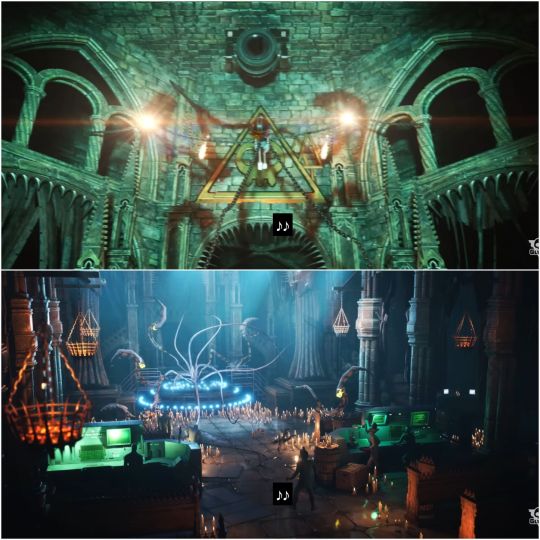
Alright another slow moment here. But I had to google wtf "MacGuffin" meant (English isn't my first language, so take it easy on me ;w;). And taking this straight from the google search "an object or device in a movie or a book that serves merely as a trigger for the plot." So most likely, the Absolute Solver is referring to the fact that Mitchell the intern set things in motion simply because he was mistaken for the real Dr. Chambers... Classic- CLASSIC human mistake XD
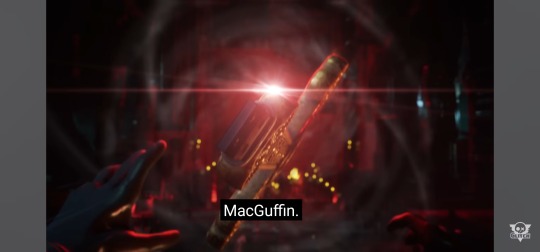
So... Heart/Nori. Something interesting is going on with her. I believe Nori WAS injured by the DDs and had to be finished off by Khan. I'll touch on Khan a bit later. But, just as seen with Eldrich J... I'm not sure why I've never thought of this before! It makes sense for Nori's corrupted core: Heart, to still function properly. Meaning, she could have snuck away when she was killed and returned to the cathedral to search for the crucifix. Uzi gets most of her style from Nori 🥹. Seems like Uzi got her mom's style and Khan's engineering abilities.
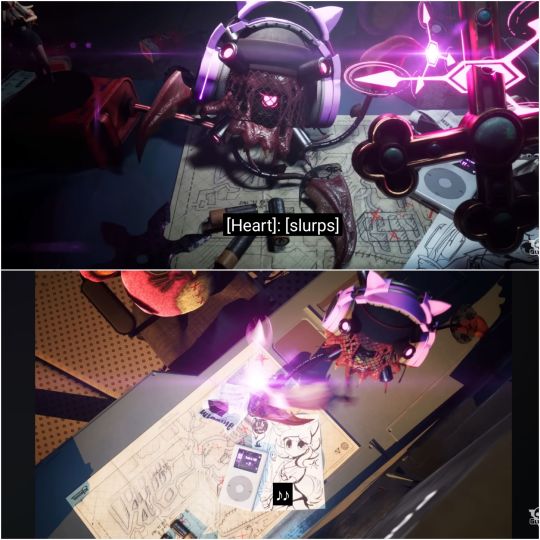
I had it all wrong- and I am ALL FOR IT! N wasn't afraid of something he saw ahead. He was upset with what they left BEHIND! V! And THIS ENTIRE SCENE
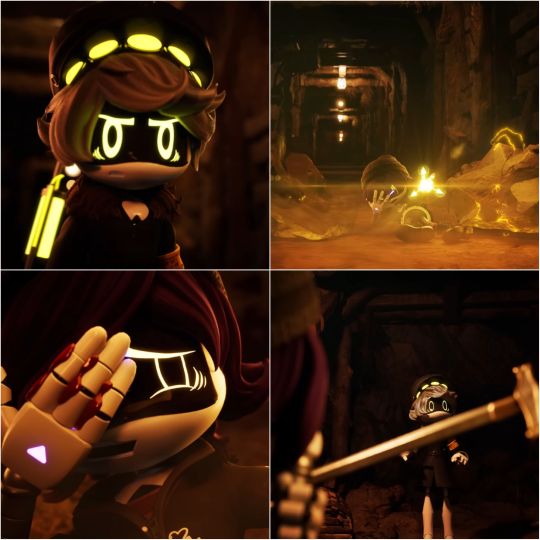
You cannot believe how surprised I was. This scene was so much better than I could have imagined it. Yes, it was painful to watch, but sweet robo-god this was executed SO DAM WELL TwT It was delicious angst. And Tessa was not in fact drawing her sword on Uzi, but instead protecting her... kinda... with an ulterior motive of course.
The gut wrenching betrayal right there. The animation team did a wonderful job at animating the betrayal and how it manifested in Uzi. Disbelief and then anger.
Not to mention her stumble. I hyper fixated on that stumble a bit too much on my first 2 watches. (Yes, I've rewatched the episode 8 times now, hush I love it XD). Her stumble shows weakness. And in that moment, she wishes to be anything BUT weak. The suspicion of betrayal is settling in, and she needs to be able to fight back. But her body is giving out. The events are taking a toll on her. And makes me appreciate the animation detail that much more.
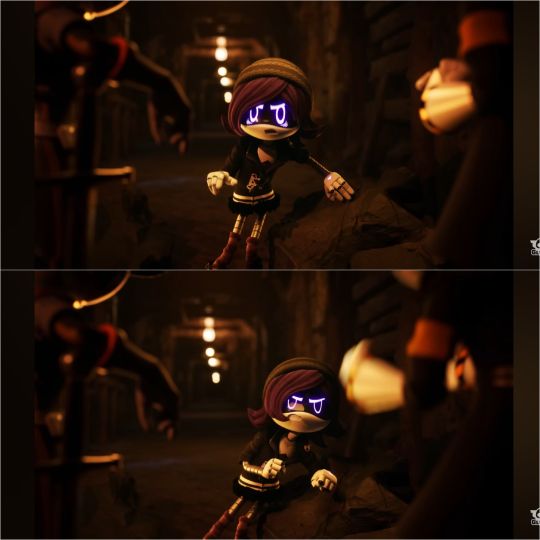
This scene N is definitely angry. He's trying his best to keep it together and Tessa's pressure to injure and kill Uzi is not helping. So for him to be talking to Uzi, while glaring at Tessa is just him driving the point home. He is NOT going to hurt Uzi, no matter what they might find down in the labs.
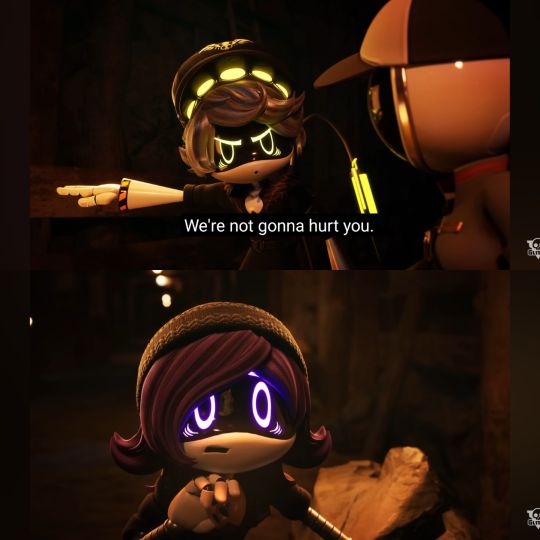
But a poor choice of words that was. It gives Uzi a glimpse of what was actually happening and what has been bothering N. The trust vaporizes, and with it, any attempts with communication.
And what I believe, gives a nod back to ep2. As N steps in to try to help Uzi up, she retreats. Same happens in this episode. And the kicker? "Falling... for you" song starts lightly playing in the background.
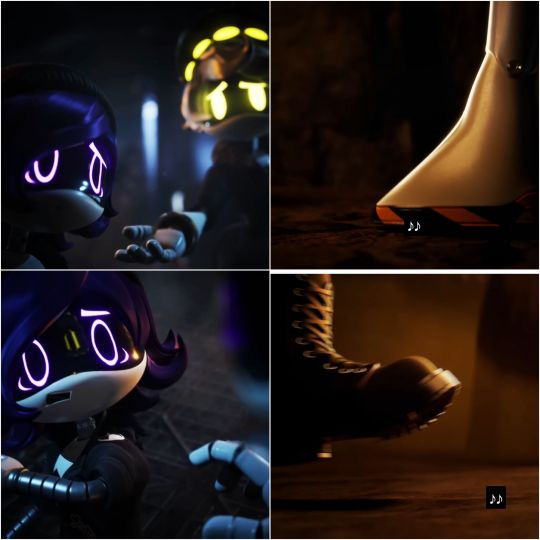
This is far too comical after he says he deserves to have his limbs cut off. The whiplash I got from that is ridiculous... in a sad and funny way.
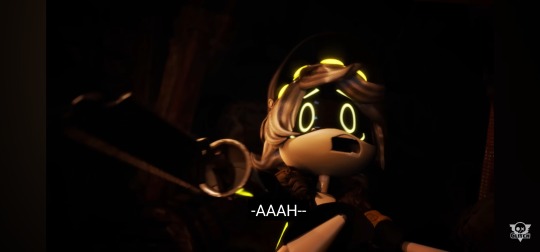
What an amazing shot. But it does paint a picture of what the DDs have done. Perhaps the blood also acted as cooling agents, and this is why the trend continued with robots- except this time around as oil. And this is what the Administration CYN most likely blocked out. Not only the manor time, but also the bloodbath that followed as Earth collapsed.
THE DOG MADE IT IN AHAHAHAHAHAHAHA
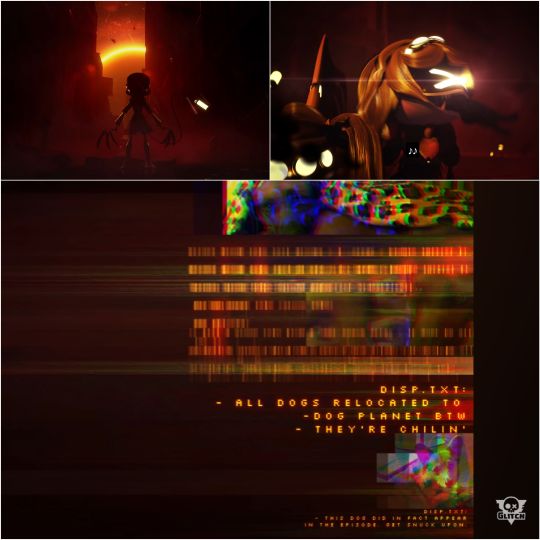
It's interesting on how the solver manifests in the drones. It seems that Uzi's wings and tail, do not make the solver go insane, and she can continue to use it. However, later in the episode the same wings and tail go berserk. So it seems that once the transformation has set in- like with Uzi- it becomes part of the drone rather something that is manifested by the Absolute Solver's control.
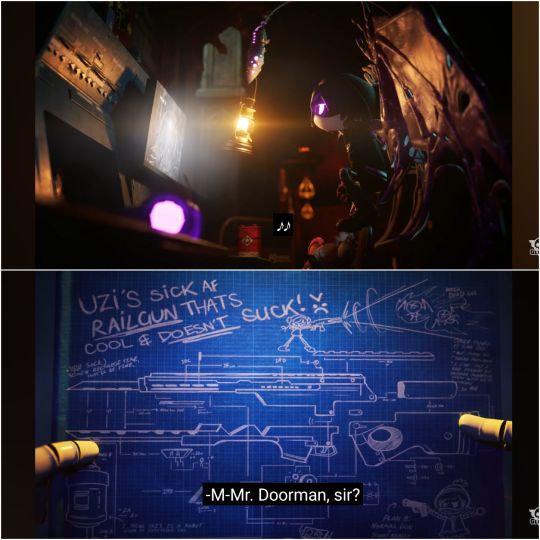
SO MUCH TO UNPACK HERE XD Part 2A that Khan refers to is on the bottom left corner, the green core that Uzi got a hold of back in pilot episode- also titled as "I think this is a robot liver or something lol."
Plan B: Uzi could have had a normal gun if railgun didn't work. Bottom right corner
Top left corner under Uzi's railgun title: "30 min recharge time. That'll be fine." Famous last words ever XD
Top right corner: "Other things it can do: Not judge me, force prom dance, I can say I had friends but fricken murdered them with sci fi weaponry."
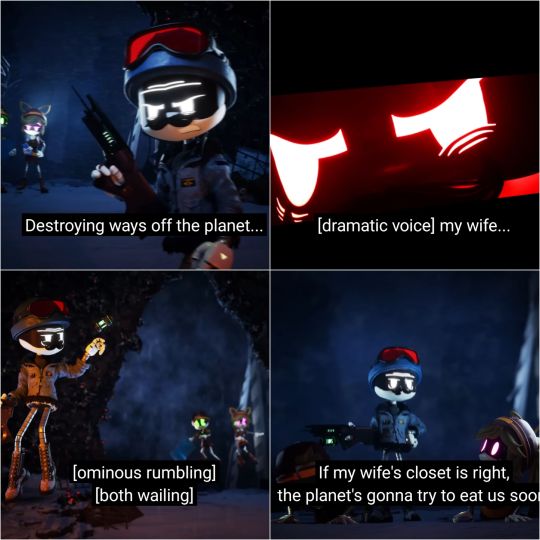
I love how sassy he is here XD His character development and arc is something that I will never forget. He has definitely come a great ways. Khan also seems adamant about his wife being completely dead. Which proves that he didn't know a single thing about the Absolute Solver and what it can do. He could only reference Nori's insane drawings and deduce that the planet was going to eat them all soon.
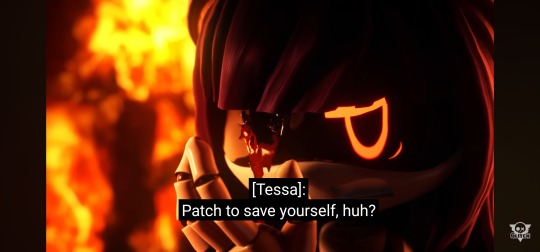
Idk if this is just my tired brain, but this comment felt like a joke to me. (Remember, I don't know anything about computers and the language ;w;) But the physical patch to save herself... as in, the same patches that are sent out for games/programs to fix bugs? That's the joke I got out of that one 😅
This entire sequence was something out of my nightmares XD The heel tapping that KEPT GETTING QUICKER definitely had me reeling back from the screen XD
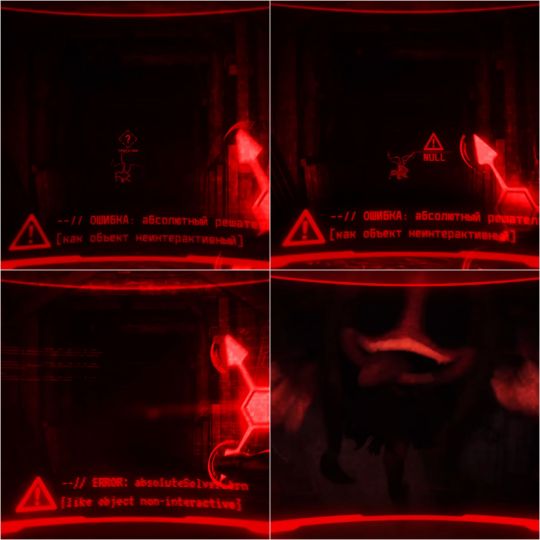
The Nori and Yeva scene was so wholesome 🥹. I loved the way the animators showed their interaction. Despite the hellish events, they were still close.
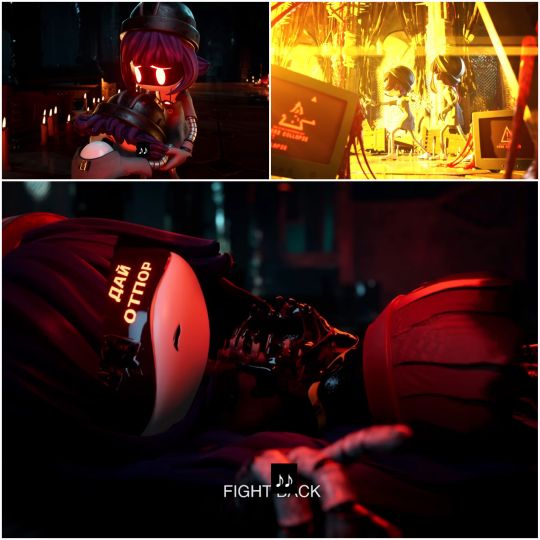
My only issue with this image is, on what is Doll moving? Not like the floor. The core is gone from her body, what the heck is still driving her forward? Perhaps just on the sheer will to warn Uzi to "fight back." And I suppose I can see how she could still move without her main core. Almost acting like chickens do, when you cut their heads off. One was able to live for 18 months after the head was cut. So I suppose I can get behind the idea that Doll's final wish was to warn Uzi, at the very least, and thus forced the body to move until it did so.
But then, Tessa shows up. Which makes me wonder if she was the one that simply lead Doll's body to come to Uzi. How? Uhhh... Absolute Solver! Let's just go with that sweat face. The con in that theory is a simple: why? Why bother leading Doll to Uzi? To spook her? To give a false reason to attack Uzi? Given that N was still very much behind them all, I don't see why the Absolute Solver would try to make up some odd reason to attack Uzi. It could just simply... go ahead. There was no one there to fool, and could incapacitate Uzi easily. Buuuut I could also be looking too deep into this, as per usual.
Hey guess what.
I found the answer. XD Just as I'm typing this up, a frame popped up.
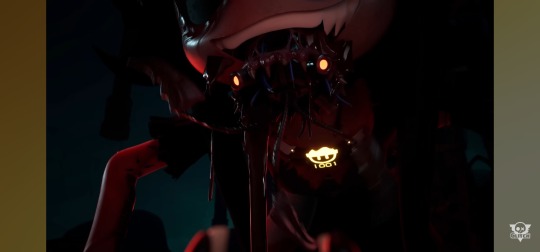
Yup, the core was still inside and thus running Doll and thus Doll could move, ok carry on. XD
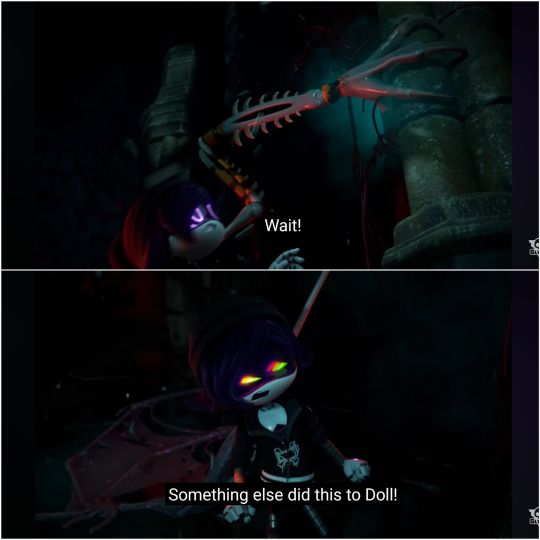
Emotions spike the Absolute Solver, something that I love seeing and appears to be less headcanon and more canon at this point for me. Through the entire episode, the Solver keeps glitching out and forcing Uzi to lose control because in this situation, she's very stressed. A betrayal, a misunderstanding, learning about the past, everything becomes too much. This makes keeping the solver at bay that much harder.
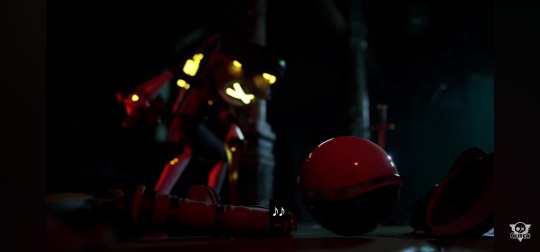
He did NOT give her any chance. Yes or no, Tessa. That suddenness surprised me- in a good way. This shows how much N has grown. He's willing to stand up for his beliefs that much better. If he suspects something, he now acts on it, and does not wait for the other side to perhaps change his mind.
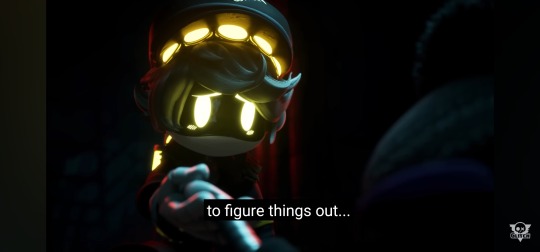
This scene. This scene shall live in my head rent free for a long while... Actually, the entire episode is gonna live rent free for a while. XD Not to mention the "Falling... for you" song plays in the background yet again. Ugh, pulling on heart strings there ;w;
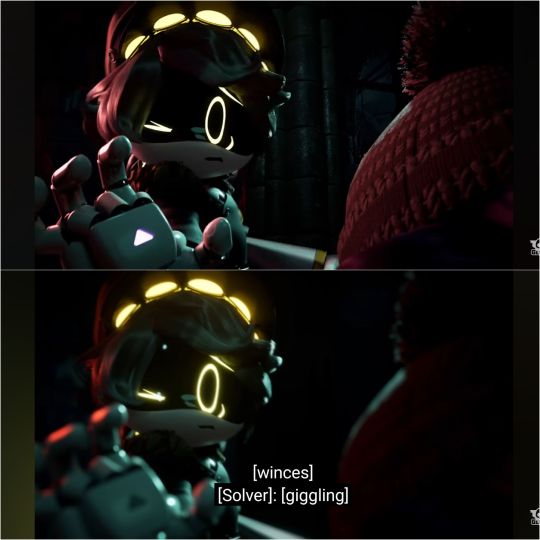
They had us all fooled XD The hand lights were on just to trick us, and in fact were meant to be off this entire time! Oh you sneaky sneaky people. >w<
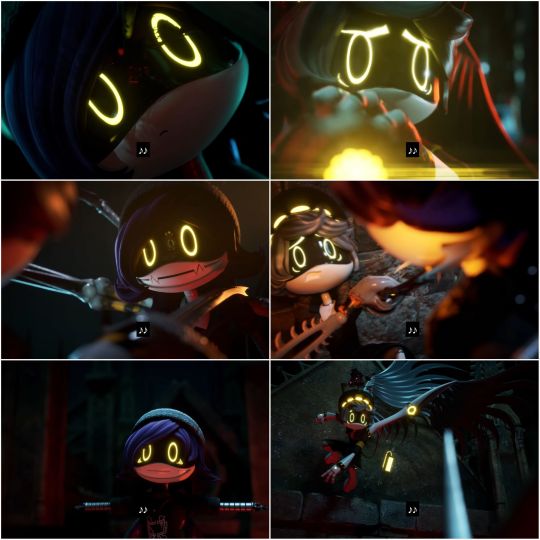
ALL OF THESE SCENES, they're all so cruel but SO GOOD TwT So cruel in context of how tortured N must be to fight Uzi, but so good in context that this fight sequence and animation is executed SO WELL. All of Nori's slaps were so personal XD Mama Nori educating NUzi
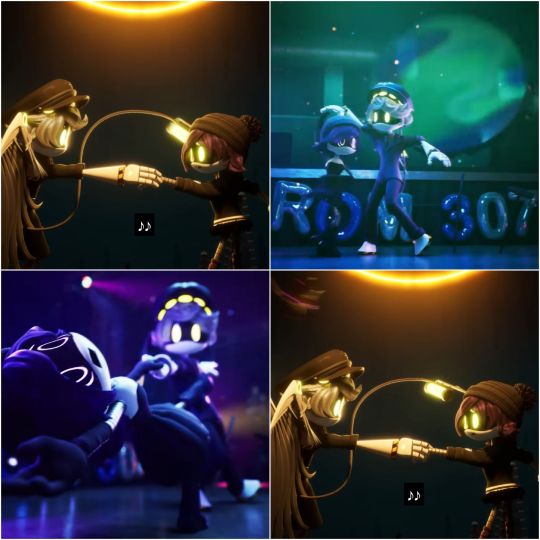
When I saw this scene, I couldn't help but think of ep3 and their dance. This entire episode is so bittersweet ;w;
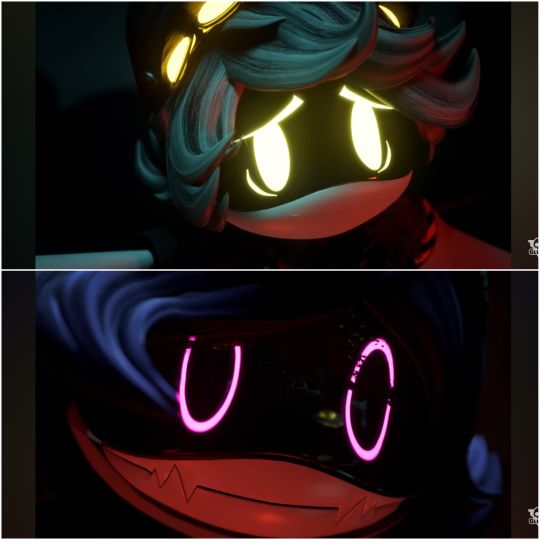
She's still there TwT And she sees this entire fight. Of what she has become and done to N and omg I'm crying again. Moving on.
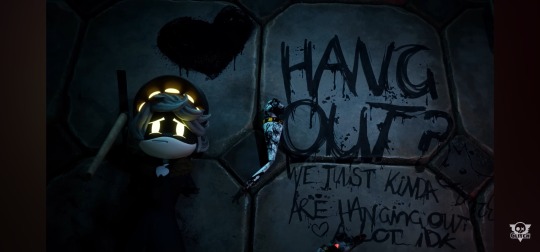
OMG YOU SILLY GOOBER BAHAHAHAHAHAHAH XD I love Nori/Heart's reaction, but the Absolute Solver also gets me laughing a bit too hard. "WHAT." That's so simple yet so effective. "What. Why. You are a DD I sent to kill the hosts, why are you hanging out."
The entire scene with NUzi screaming. Just. YES. What better way of gettin rid of stress than screaming! ^_^
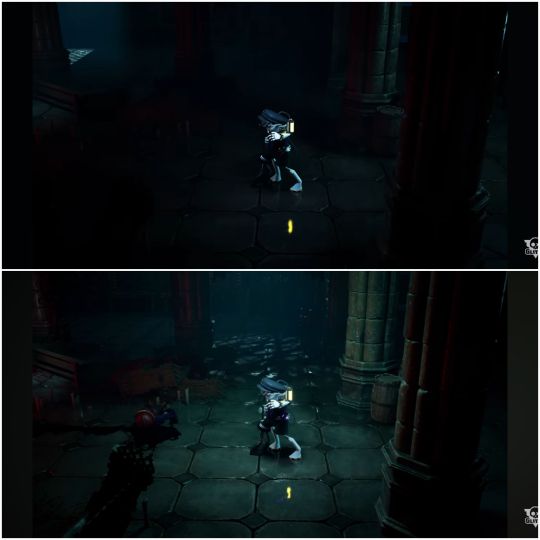
Oh you sneaky, sneaky people. Well, all I can say, you got me. You got me good. This is something I didn't think of, but should have. It's simple to get these shots with certain rigs missing. And it was done seamlessly. Well done, well done. I begrudgingly applaud you. XD
HE'S PATTING HER HEAD AAAAHHHHH *proceeds to ascend to another realm*
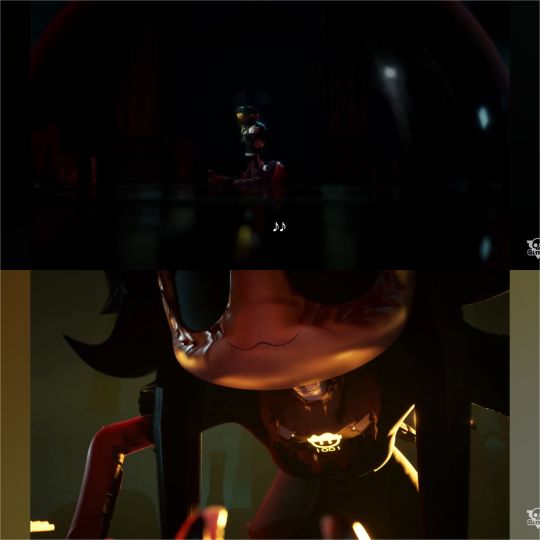
They did not... omg they did XD Ah, yes, welcome a new horror oh and by the way here- :3 a cute face
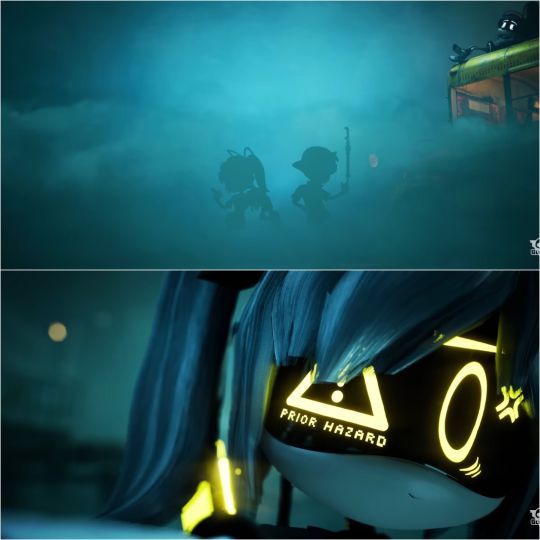
Omg they look so cool- KHAN WTF XD
LOL J THE PRIOR HAZARD WARNING AHAHAHAHAHA
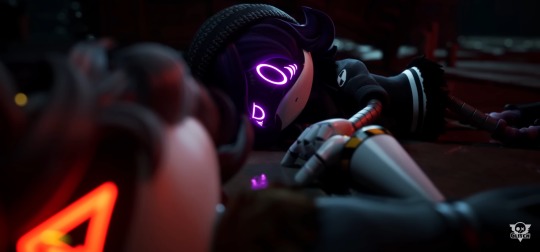
The way she shook his hand trying to snap him back to himself and wake up 😭. And the entire sequence following this... I'm just now slowly starting to process it, oh and great I'm sobbing again. Alright, moving on.
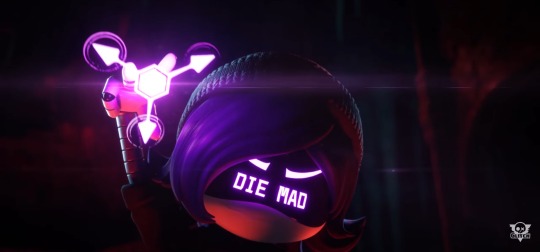
Well, I have some thoughts in this. This is personal thoughts, thus this is where you are more than free to yeet this section into the void that Uzi was dragged into... sorry that was a bad joke- anyways. "Die mad." I feel like this is her way of telling N to not give up. To go out there and FIGHT. But if he can't win, then to die like she is. To die in a way that he will be proud of and to go batsh*t crazy. Because by now, Uzi must know that all of their chances of survival are slim. So you might as well go out with a bang and "die mad."
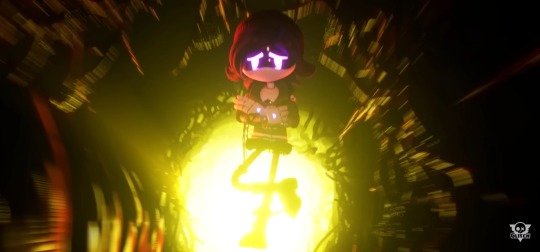
Something I noticed and was further solidified when @bloodywolfwings also mentioned it. Uzi looks at peace here and very accepting of death. And I say, yes, she very much is. I think this was a way of her asking N for forgiveness. For getting mad at him in the beginning of the episode, for failing to be useful/protecting N, and for fighting against him- despite being possessed. And perhaps even, as an incredibly insane and radical thought, for loving him. This entire episode has put the characters and us through the wringer, and that "sacrifice" was just the cherry on top.
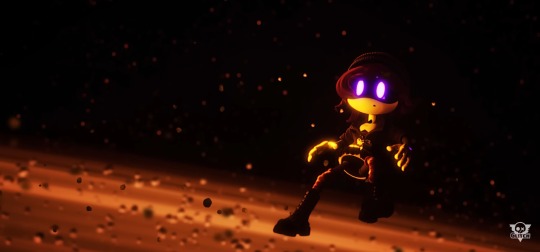
Something I have seen already mentioned once at very least (by @/rebecca-babe) and something that also put me on edge was the ending credits... or the lack of. Of course, all the credits roll, but it's not the usual type. Instead of an upbeat music that is either "Uzi the drone killer" or a theme that was seen in the episode... its SILENCE. Being a musician myself, I love how much love has been put into Murder Drones. The sound effects and the main music are always top-notch. But that ending unsettled me the most. The lack of all noise is something that is terrifying and unsettling in that ending. Almost like all the music and sound left with the "sacrifice" of the main character, Uzi. The entire episode was filled with sounds, silence only being present when something incredibly WRONG was happening - like at the beginning when intern Mitchell re-entered the cathedral. And as much as I love how well executed this entire scene was, I hated it. Because that scene does the job that it was set out to do. Put you on edge, and make you feel like all hope is lost. That this is it. This is the end.
This is the end of my rambles and thoughts that I had while watching ep7. I may have more later on as I keep rewatching this episode for the rest of the week ;w;
Want to hear more of my stupid rambles? This has 3 other parts!
#murder drones#murder drones theory#murder drones n#murder drones uzi#murder drones cyn#murder drones nuzi#murder drones nori#murder drones yeva#murder drones absolute solver#murder drones tessa#murder drones sentinels#murder drones episode 7#murder drones ep 7#glitch productions#bluginkgo's rambles/theories#murder drones khan#n x uzi#nuzi#md nuzi#murder drones j#murder drones v#murder drones thad#murder drones lizzy
62 notes
·
View notes
Text

@joltning I present to thee the elaboration requested:
When broken down to the bare essentials Wash and C.T fulfill the same function within the story, and the differences between them as characters mostly results from how the story was executed when it came to them fulfilling that function.
For example, everybody (myself included) complains about how C.T exists solely as a plot device in the Freelancer Saga, but nobody complains about how Wash also exists solely as a plot device in Recovery One and Recollection. I mean Reconstruction is literally the ‘omg theres a plot!?!?!?!?” season of RvB, and without Wash there is no story.
The main reason Wash isn’t perceived in the same way as C.T is due to the level of freedom the writers had when it came to telling the story they wanted to tell. The Blood Gulch Chronicles and Out of Mind set the foundations for Recovery One and Recollection, but it was through Wash that the lore of RvB was reconstructed into a cohesive story. The unexplainable was explained, the unelaborated was elaborated upon, and all the wacky hijinks and random bits and bobs of the previous seasons were tied together in a way that answered the question asked in episode one: Why are all of these idiots stuck in a canyon in the middle of nowhere while being separated into color coded teams that are fighting each other?
C.T however did not have the same level of freedom as Wash, and this is because of pfl’s nature as a prequel combined with the pacing of those seasons. We pretty much already knew everything about her that there was to know, so there was no point in hiding anything or taking it slow because of that, hence the painfully obvious foreshadowing. This approach to the Freelancer Sage, and C.T’s story is what leads to her essentially having the same arc as Wash, just reversed—or more accurately described; mirrored, like Chief and Arbiter in Halo 2.
A majority of the reversal and/or mirroring between them manifests in their personalities, which I actually talk about some here, but some examples of the phenomenon in regards to actual plot points are:
They are both introduced as recovery agents (or rather fake C.T, who was the real C.T at the time, was introduced as a recovery agent). Wash is a single agent recovering human technology from dead Freelancers, and he uses explosives to destroy the rest of the equipment to prevent information leaks. C.T is attempting to recover alien technology from a long dead civilization with the help of other aliens, and he uses explosives to make sure anyone who knows of their operation and presents a problem will be destroyed to prevent information leaks.
We knew exactly who Wash was, who he worked for, and why he was reassembling the blues. We didn’t know who C.T was, who he worked for, and why he was fighting Tucker in the desert.
Wash was shot in the back and survived, but failed to subdue the enemy. C.T was shot in the chest and died just as they were going to subdue the enemy.
In regards to the real C.T, some examples include:
The Meta was portrayed as the primary conflict for Wash, but in reality he had always been aiming for the destruction of Freelancer. On the flip side, C.T’s fight to take down Freelancer is portrayed as the main conflict, but in reality, while poorly explained, tracking down the alien artifacts seemed to be her real goal (which is not as insane as it sounds when you remember that Charon Industries was more aligned with the UNSC proper than pfl was).
Wash never hinted towards his plan of taking out the Meta in Recovery One to South, or his plan for destroying Freelancer to the Reds and Blues until he had the perfect opportunity to strike, and by then he had built enough trust that they were willing to help him out despite his secrecy. If they weren’t, well, he knew what to say to change their minds. C.T however wasn’t exactly subtle with her thoughts and feelings, and she didn’t build any trust with the people around her, so when she finally defected—which didn’t take a genius to see coming—no one was willing to listen to her or take her at her word, and there was nothing she could say or do to change their minds except offering concrete evidence. “I’m starting not to trust you.” vs “I can’t trust you.”
This one isn’t a plot point, but I’m going to mention it anyway because I think it’s a nice example of this subtle yet obvious mirroring I’m talking about, and shows what I was trying to replicate in my blurb that spurred me to finally write this analysis:
Counselor: Agent Washington? Agent Washington?
Washington: Sorry, what were you saying?
Counselor: Were you thinking about Epsilon again, Agent Washington?
Washington: No.
Counselor: What happened with Epsilon was not your fault, Agent Washington.
Washington: I didn't think it was.
Counselor: We have safeguards for the unstable emotional patterns of an artificial intelligence. Sometimes these algorithms fail.
Washington: Oh. So then it's your fault.
Counselor: We prefer to think of it as no one's fault.
Vs:
Washington: It wasn't your fault, Connie.
Connie: Easy for you to say. You didn't drop the ball.
Washington: The ball got dropped. We were all there, it's everyone's responsibility.
Connie: Dammit, why are you doing that?
Washington: What am I doing?
Connie: Making excuses for me. I'm not making excuses for myself...why are you?
All I've mentioned above is also why C.T’s relationship with the leader and the plot twist that the C.T in the desert wasn’t the real C.T are disliked by so many, as there was nothing to justify the sudden bait and switch like there was at the end of S6. I mean, considering we see both Tex and South use voice mods to sound like men, it reads as though that was supposed to be the case with C.T as well, which makes it feel like it was changed at the last second because everyone saw it coming.
This is an issue because A) There's nothing inherently wrong with being predictable—a good plot twist always has foreshadowing, even if it won’t be registered as foreshadowing until the twist happens in certain cases—and B) The story of the Freelancer Saga as a prequel was confined in a box created by the previous seasons, and all they were doing was connecting the aforementioned events to tie up a few loose ends and properly establish Carolina's driving force in present day S10.
#mine#rvb#red vs blue#agent connecticut#agent washington#not t/oaru#idk how to properly conclude these posts. maybe I should just start going gg and leave it at that
31 notes
·
View notes
Text
Deltarune: Fool's Fate Chapter 1 Bosses
Now that I've posted Remie's ref, time for the main bosses of Chapter 1 of Fool's Fate! Why are there two? Why not? (Really it's to make it easier to cram like, 14, 15ish tarot cards into 10 chapters?)

The rulers of the attic Dark World. Or more accurately, the leader and her right hand man. Upon entering the attic Dark World and after meeting Remie, Chicago and CK (and Broadway) run into The Magician (aka The Magnificent Magician Magico) first as he barges through Remie's little fortress to stop the Lightners from closing the Dark Fountain in the name of the The High Priestess (or High Priestess Bailette who isn't properly met until the very end of the chapter.)
Magician fills a sort of Lancer/Queen role, following and trying to thwart the party as they traverse the attic world, all the while, idolizing his Priestess. Being very active and eccentric as well as trying to test the party's (pr specifically Chicago's) potential.
The Priestess, meanwhile, is only mentioned throughout the chapter until you fight her and Magician in the final battle. Her presence is felt but she's rarely seen. Even when you do finally meet her, she's cool,, level-headed, and quiet.
Even in the final battle, Priestess isn't actually shown to attack that much, mostly providing support by boosting Magician's attack and using some support attacks that are easy to dodge on their own.
Their names (at least the ones they tend to go by) are derived from the tarot cards that inspire them. Magician being, well, the Magician, and Priestess being the High Priestess. (For the names Magico and Bailette, Bailette comes from a previous iteration of this story, The Puppet and The Real Boy, and is a pun on ballet, baile, and the name suffix -ette. Magico is just derived from magic and I added an -o to the end) Asides from being inspired by tarot cards in both name and personalities, their actual Light World items are a magic kit and a ballerina music box.
Backstory under the cut
Once just a simple Pirolette among the choir, Bailette wasn't really anyone of note. She played her role, she sung her part, as just another voice in the crowd of sopranos representing the populus of the attic world.
Yet even despite her small role, Magico (head of the Baritone/Bass section) was completely enamored with her. He found her voice alluring, its soft and quiet notes matching her gentle and subdued personality. ... And so it turns out, Magico wasn't the only one whom Bailette had caught the eye of either...
For one day a Knight arrived to the land. Twisted ribbons dancing in the wind as they stabbed into the earth to give this world its form. A great geyser of darkness flowing forth and amazing all the Darkners who witnessed. After wards, the Knight declared the Lightners the Darkners worshipped abandoned them long ago, leaving them up here to rot and collect dust.
The Knight then pointed to Bailette, appointing her the land's new Priestess and leader and warning her that soon a group of Lightners will arrive, only to try and seal the Fountain the Knight just opened. Soon after, the Knight disappeared, leaving the attic world to it's own devices.
Now left on the throne, Priestess went a bit mad with power. She locked up anyone who dared to oppose her and started plotting silent revenge against the Lightners who had abandoned them and their world. She appointed Magico as her head Magician and right hand, her loyal guard who was tasked with carrying out her will. The Magician was happy to oblige, still madly in love. She was his Priestess, and he was her loyal Magician. Together they ruled from the top of the Choral Chapel. ... Until a group of Lightners stumbled into the world, just as the Knight foretold.
--------------------------------------------------
🏱︎♋︎ ❍︎♐︎⌧︎ ❍︎⬧︎⌘︎♌︎♒︎●︎⌧︎❖︎ ⍓︎🙰♒︎♎︎⬥︎
✠︎♎︎⬧︎♒︎⌧︎❖︎⌘︎ ♌︎⧫︎⍓︎□︎⬧︎⬧︎♑︎♎︎ ◆︎⌘︎♒︎🙵 ❍︎□︎♓︎ 🙰□︎♐︎♏︎⬥︎
😐︎♋︎♑︎♏︎⬧︎♍︎ ♌︎⬥︎♌︎□︎ ⌧︎♌︎ ◆︎🙰♒︎♎︎⬥︎
☞︎♌︎❒︎ ♏︎⬥︎❍︎ ♏︎⍓︎♑︎🙵 ❍︎⍓︎ ⧫︎⬥︎⬥︎♋︎♋︎ ◻︎♑︎❍︎□︎ ❑︎■︎♐︎♒︎⬧︎
✞︎❑︎🙵🙰 ❖︎⬧︎♏︎♓︎ ⬥︎♌︎ ●︎♑︎◆︎♒︎◻︎
☪︎⬧︎❍︎⌧︎♒︎⬧︎⍓︎⌧︎❖︎⌘︎ ⌘︎🙵◻︎🙵❍︎♒︎ ⬥︎⍓︎ ♓︎◻︎⌧︎ ♌︎⧫︎⍓︎□︎
✠︎❖︎□︎□︎♎︎♏︎●︎ ♏︎🙵❖︎♋︎⌧︎ ❒︎□︎♍︎⌘︎❍︎🙵
✡︎♑︎🙵 ❒︎🙰🙵 ⌧︎⌘︎🙰⌘︎♑︎♍︎❒︎ ⌘︎●︎🙰 ⬧︎♋︎❍︎◻︎⌘︎♎︎❑︎
✌︎●︎❖︎ ❒︎⬥︎♌︎□︎ ❒︎♓︎♑︎🕯︎❒︎ ♋︎●︎◻︎◆︎ ♒︎❖︎⧫︎♍︎⬧︎
☟︎●︎ ◻︎□︎♍︎ ❍︎⬧︎♐︎◻︎ ♎︎■︎ ⧫︎🙰♏︎ ⬥︎◻︎♐︎❑︎⬧︎♎︎
💧︎❑︎⬥︎ ♐︎⌧︎ ♋︎♓︎❑︎⌘︎ ❖︎◻︎♑︎ ♋︎♌︎●︎♎︎
☪︎●︎♐︎♐︎♎︎ ❍︎♋︎♓︎⬥︎♍︎ ♌︎◆︎⌧︎⧫︎ ⧫︎♍︎♍︎ ⬥︎❑︎●︎ ■︎🙵♒︎❍︎⌧︎⬧︎♑︎
☹︎ ●︎⬥︎🙵🙰⬥︎ ❖︎🙰 ✋︎□︎♐︎❖︎📪︎ ◻︎ ♏︎♒︎◻︎♏︎🙵 ⬧︎🙵 ☪︎⬥︎❒︎⬥︎♌︎
❄︎ ♏︎♌︎⍓︎◻︎ ⌧︎♍︎ ⧫︎⌘︎♎︎⧫︎♌︎❑︎♋︎ ♋︎⬧︎ ♑︎⬧︎❑︎⌘︎♌︎❍︎ ❍︎♐︎⌧︎ ❒︎❒︎■︎◆︎❖︎♏︎
#deltarune#deltarune fan character#Deltarune: Fool's Fate#dr atticworld#dr:ff atticworld#deltarune oc#petra's deltarune take#deltarune au#petra art#fool's fate#magician magico#high priestess bailette#the magician#the high priestess#magician#priestess
24 notes
·
View notes
Text
CyberSix - The 90s trans Animated Series, you did not know about
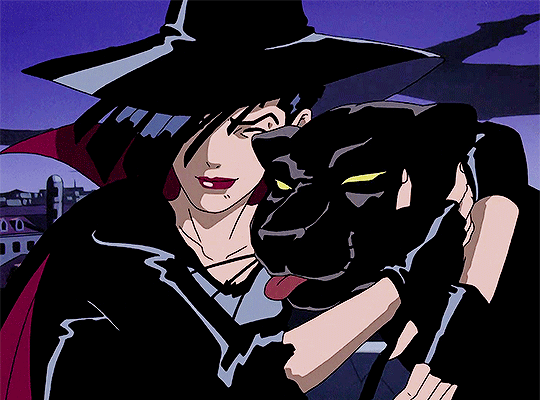
Okay, I think it is time for me to talk about this Canadian/Japanese/Argentinian animated series, because it just is... surprisingly really good. And while maybe the entire trans/queer subtext was not entirely intended... It is so clearly there and really fucking amazing.
CyberSix is about, well, CyberSix, who has been created in genetic experiments by a Nazi scientist, who after WWII escaped to South America. While Cybersix escaped the laboratory, the Scientist Dr. Von Reichter still conducts genetic experiments on all sorts of animals and people. But he also wants to see Cybersix returned to him. So, to hide from him, Cybersix takes up the identity of the male teacher Adrian Seidelman, who teaches at a school for troubled teens. Things complicate, though, when she develops feelings for her colleague Lucas.
Now, let me be up front about two things... No, three:
Due to low ratings outside of Canada, the show was cancelled after only one season. Which also means that the ending of the show is kinda bittersweet - as what was meant to be a cliffhanger ended up to feel very finite.
The comic this was based on was on one hand very anti-Nazi. But at the same time it also uses a lot of racist stereotypes when depicting the Japanese characters (of which there are quite a few). While the characters are portrayed as good people, mind you, who end up helping Cybersix, they are depicted in a very racist way.
Also, if you look at the open ending and think: "Oh, maybe I should read the comic." Don't. Just don't. Trust me on that one. I read it. And it is... oh boy. Cybersix in it mostly exists as a male sexual fantasy. And in general the comic is very, very happy to show us naked women all the time, at times with explicit rape scenes. So, yeah, you definitely want to skip that one.
Still, despite those flaws. The show... is actually really fucking good. Especially because of the queer stuff.
While in the comic this was based on the fact that Cybersix hides under a male identity is just a plot device, in the series it actually is a lot more complicated. Because in the series we see Cybersix struggle with her gender identity. After all, she has been created, her sex was quite literally assigned to her. And while on one hand she kinda fantasizes about being with Lucas as a woman, she at times also feels more in home being seen as a man.
And while Lucas does not find out her true identity till the end of the show (again, there was another season planned), he kinda has feelings for Adrian and for Cybersix, not knowing they are the same person, making this king bisexual or pansexual (I read him as pan).
Meanwhile, of course, the main plot of the show is quite literally about punching Nazis, which is something I always can get behind. It literally deals with something that has happened in the real world (Nazi folks fleeing to South America) and I kinda think that this is neat.
For a while the show was on Youtube, but it sadly seems it was removed. You can still find it on... certain websites, though, given that the DVDs are hard to get a hand on.
I really recommend everyone to watch this show. Its just 13 episodes and it is... really, really good.
125 notes
·
View notes
Text
Chess (2018 Kennedy Center revival)
So I was just going to briefly mention all the other different versions of Chess I have consumed in the big essay post I’ve been writing on and off, but there was just too much to say about this one which made it really awkward to fit it in, so fine, here is another individual chesspost. Nearly 7500 words of rambling under the cut, oh my god.
This production represents the latest official full overhaul of Chess. It sports an all-new book written by Danny Strong, also known as the actor who played Jonathan on Buffy the Vampire Slayer, which is some whiplash (Sarah Michelle Gellar is apparently a big Chess fan, too). It was later staged again as a concert with some further modifications in 2021, but I listened to an audio bootleg of the 2018 version. (There exist some videos of it online, but only scattered bits.)
The Story Changes
This version has London’s basic plot structure with the distinctive two chess tournaments (this time four years apart, which is neither the original number nor the actual number of years between world chess championships), but rearranges Act I, adds a lot more quippy dialogue and swearing, reinterprets the characters, and recenters real-world politics in the whole thing — sort of the exact inverse of what Chess på svenska did with the material. It opens with “Difficult and Dangerous Times” to set the scene in the Cold War and features the Arbiter narrating with sardonic omniscient commentary between songs/scenes throughout, which does feel a bit more consistent than the Arbiter suddenly having a narrator role for the duration of one song in Act II.
All the main characters in this version are reinterpreted with significant new background context, which is a very interesting way to rewrite it that I definitely dig in principle. For example, Florence’s first scene here involves Walter threatening her with deportation from the US unless she can make Freddie behave for the duration of the tournament. Most versions of Chess make the political scheming very symbolic and vague — exchanges of mostly unnamed political prisoners or handwaved concessions — but this version is noticeably specific, with specific nuclear arms treaty negotiations that the CIA believes would be negatively affected if Freddie keeps openly antagonizing the Soviets. She tells Walter to go fuck himself (told you it adds more swearing) and that nobody can control Freddie Trumper, but ultimately she doesn’t have much of a choice but to reluctantly play along. This addition recontextualizes her character and her interactions with Freddie in Act I a fair bit — it’s pretty significant, after all, that she is under threat and may lose her home if she doesn’t somehow control what she really can’t.
Meanwhile, Freddie himself here suffers from a full-on mental illness which he takes medication for. Walter asserts on a phone call early that they’re dealing with a “genuine paranoid schizophrenic”, but then later calls him a “bipolar bitch”; I take the blatant inconsistency combined with the obviously insulting nature of these remarks to mean probably we’re not meant to take either of them at face value, but these two lines from Walter are the only ones suggesting any specific diagnosis. (I unfortunately suspect Danny Strong didn’t have a specific condition in mind and research it so much as just slap him with a Generic Ambiguous Mental Illness for which he takes Pills.) One way or another, Freddie’s ambiguous mental illness gives him bouts of intense paranoia, driving him to do things like trashing his and Florence’s hotel room to look for listening devices at one point. Florence keeps insistently, frustratedly telling him to just take his goddamn pills even as he’s in genuine distress; it’s pretty uncomfortable, and also definitely one of those things that are at least more human when his episodes could cost her the only home she has: she’s desperate and in distress too.
(I do kind of feel as if this whole bit would make more sense if Florence and Freddie had a strictly business relationship here to start with, instead of being explicitly portrayed as a couple — when they have a committed intimate partnership going on, one would think Florence getting deported would also be pretty obviously significant for Freddie, and Florence quietly playing along with the CIA and crossing her fingers that she can indirectly coax him into behaving with seemingly no serious thought given to whether it’d be better to just tell him why he needs to stop feels stranger. The scene with Walter sounds like Walter/the CIA are not aware of their romantic relationship and Florence wants to keep it that way — they both refer to Freddie strictly by his full/last name and as “her player” — so I guess Walter would have assumed she wouldn’t tell him, but surely the calculus would at least look a bit different to Florence herself. Even if it just prompts her to realize Freddie would still be liable to react by becoming even more erratic and vocal about his paranoias, that feels like it’d be significant enough, at least for her feelings on this relationship going forward, that it never actually coming up or being suggested within the story starts to feel marginally odd. Not a major complaint, though, just a bit of overthinking.)
Freddie in general is noticeably portrayed much more sympathetically here than usual throughout. Where other versions of Chess tend to present Freddie as an attention-seeking drama queen who plays up ludicrous arbitrary demands for money and press, here things like his walkout from the first chess game are made to come from a much more genuine place: he has major sensory issues and is intolerably thrown off balance by distracting noise and lights (which really are deliberately arranged to sabotage him). “Florence Quits”, the song with the misogyny verse, usually reads as being triggered by his jealousy and inability to accept that Anatoly’s just playing better than him, but this version makes it feel more about how he feels persistently gaslit about the ways he’s being sabotaged than anything else: he accuses the Soviets of having a hypnotist in the front row to throw him off (which they do, and Freddie literally saw him and recognized him) and Florence of working for the CIA (which she has been, if not by choice) while they deny it and brush it off, and the tense opening notes of the song play under him desperately yelling “You’re lying to me! You’re all lying to me!” (Which doesn’t make the misogyny okay, obviously, but it does make it feel more like a desperate, paranoia-fueled lashout where you don’t know how much he really means all that.)
When he subsequently forfeits the match against Anatoly, he makes a speech that sounds absolutely despairing where he says chess has been taking a toll on his health since he first became champion at eleven years old, and he doesn’t feel he can trust anyone, even himself. In Act II, before “The Interview”, he even actually apologizes to Florence for how he treated her; heck, his motivation for going so hard after Anatoly in “The Interview” itself is portrayed as being that he is genuinely disgusted by Anatoly leaving his family so callously (which is a lot of fun given Freddie’s own issues about his father leaving him and his mother behind) and wants Florence to hear the truth about what a despicable man he is, which is still unpleasant to her but clearly comes from a much more sympathetic place than either simple spite or reluctantly complying with Walter’s orders.
As for Anatoly… he was taken from his parents when he was a small child to be groomed by Molokov and the KGB into becoming a chess champion, and he’s well aware from his very first scene that the state had killed the previous Soviet champion after Freddie unseated him. (Freddie excoriates the press early on for not covering why the former champion disappeared off the face of the Earth because they’re too busy bashing Freddie, which sounds like paranoia, but the narrative has actually told us Freddie is right and they really did execute him but no one but Freddie seems to notice or care — another way in which Freddie is jarringly sympathetic here. In general, Freddie is portrayed as paranoid, and the other characters treat him like he’s just paranoid, but the narrative keeps proving Freddie’s paranoia right.)
Anatoly, though, isn’t afraid of the same fate, because “The state cannot execute a man… that is already dead.” (This general sentiment could press my buttons, but it just feels super corny and melodramatic the way it’s presented and performed, especially with that dramatic pause in there.) He is deeply depressed, thinks his marriage to Svetlana is fake and his kids hate him, and says repeatedly in Act I that he hates chess and just wants to be free of it, though he also describes a particular championship match he watched as the only time he’s felt love. At the end of Act I, he defects to the UK along with Florence as usual (his defection fully blows up the treaty Walter was worrying about despite Anatoly’s victory, so Florence’s refugee visa is indeed revoked, and that’s why they end up in the UK). Theoretically he should be free of chess now, but it bothers him intensely that he only won by forfeit (here they never finished playing a single match), resulting in him returning to defend his world champion title, and win it ‘properly’, four years later in Bangkok against Viigand.
Unknown to Anatoly, by Act II, after the election of Ronald Reagan, the Soviets are extra on edge and believe a planned NATO military exercise is actually the US mobilizing for a full-scale invasion of the Soviet Union. Walter tries to convince Molokov it’s just an exercise; Molokov insists unfortunately the generals are going to believe it’s an invasion and be ready to retaliate unless Viigand wins the championship (if Viigand wins they will take it as a ‘sign of goodwill’ from the US, which will change their minds on the apparent invasion because, uhh, unclear). Throughout Act II, the larger stakes in this version are set up to be that if Anatoly should win the match, the Soviets are liable to start a nuclear war.
Does Walter go to Anatoly to frankly tell him that apparently the Soviets have lost their minds and are basically threatening nuclear war over a chess match and try to convince him to throw on that basis? Does Molokov realize that if he’s telling Walter to go rig the chess match so the generals will call it off, he clearly doesn’t actually believe that the US is about to invade, so probably he should be trying to convince the generals not to go for the nuclear option himself? No, of course not; this is Chess, so we have to have the songs that are in Chess. So instead, Walter and Molokov just go through the same indirect schemes as usual to unbalance Anatoly and convince him to throw the game, with some minor twists. Molokov actually actively threatens Svetlana with being sent to a gulag to die if she doesn’t convince her husband to return — and Svetlana does straight-up tell Anatoly this, only for Anatoly to brush her off and tell her they won’t do that. Florence learns the same from Walter and initially dismisses him, and fully doesn’t believe him about her father being alive, but does ultimately sympathize with Svetlana and worry for her, which I like. But Anatoly is obsessed with winning this championship above all else and fully convinced Molokov is bluffing.
In the end, he plays the game to win, oblivious to the nuclear threat; as he checkmates, Walter makes a desperate phone call to his superiors to call off the training exercise. (Why he didn’t just do that immediately when Molokov told him the Soviets were taking it as an attack, instead of spending all this time playing along with this elaborate chess mind game, is a mystery.) Only… they don’t, and the Soviets watch with their fingers on the nuclear button, but ultimately they don’t fire. The Arbiter’s narration informs us this was the closest the world ever came to destruction, even closer than the Cuban missile crisis, and that this then served as the wake-up call that prompted negotiations about nuclear deescalation.
Anatoly, meanwhile, returns to the Soviet Union as usual, this time successfully exchanging himself for Florence’s imprisoned father, and Walter gives Florence and her father visas so that they can return to the US together.
Broad thoughts
I feel profoundly weird about the mixing of real-life history and completely fictitious alternate history here — you can’t just assert in narration that the fictional events in your musical were what taught the US and Soviet Union that maybe they should just talk to each other, while making a specific comparison to an actual thing that really happened, after spending the musical asserting that the Soviets murdered chess players for losing the world championship. I think mixing history and fiction can work fine if we can imagine that for all we know this is what really happened, or alternatively that this is what might have happened in some alternate universe similar to but distinct from ours. But here, we’re creating highly significant and publicized events that are obviously fictional, making it absurd to pretend this is what really happened, while also presenting these fictional alternate-universe events in objective hindsight narration alongside real events that happened in the real world and as a supposed cause of them. This ending narration just feels like it’s weirdly trying to have its cake and eat it too.
All in all, though, I think this is definitely one of the most interesting efforts to rewrite Chess. It definitely has something it’s going for, there are several neat ideas in it, and in particular I appreciate that it tries to give extra attention to the characters, more context to their actions, and more messy, humanized depth, inner conflict, and complicated motivators and stressors behind what they do. I genuinely enjoy what it’s doing with Freddie in Act I, in particular, even though it feels somehow both jarringly like it’s woobifying him (I genuinely think he ends up coming across as the most sympathetic of the three mains here, with so much of his erratic, childish and unpleasant behaviour being recontextualized to be more understandable and the way his hatred of the Soviets keeps being validated by the narrative) and like the narrative is weirdly harsh on him (this much more sympathetic Freddie who suffers from an actual mental illness is treated like absolute irredeemable scum by every other character including the fourth-wall-leaning narrator, even more than usual).
I also think the restructuring of Act I was pretty solid for the most part, though there’s definitely some awkwardness, like how Freddie’s expanded encounters with the press sort of clumsily repeat the same beats a bit. On the one hand, I can get what Danny Strong was going for in choosing to introduce everyone first and then go into “Merano” instead of doing several minutes of narrative meaninglessness before the main characters are even introduced; on the other hand, that kind of just half-defeats the sole original purpose of “Merano”, which is to provide a very jaunty more stereotypical musical theater song so that Freddie can be introduced via barging in and interrupting it with his very different vibe, and if I were Danny Strong I would definitely have just removed “Merano” at that point. But the “Difficult and Dangerous Times” opening works great, and it nicely avoids the “almost nothing of note happens for nearly forty minutes” and “several meaningless fluff songs in a row” problems of the London script, introducing conflict and stakes early and keeping the narrative going.
Ultimately, though, a lot of what it’s trying to do doesn’t quite come together to me, and some of it is variously misguided or just strange.
The Politics
To start with, I can definitely get wanting to emphasize the role of Cold War politics in the narrative, and I basically enjoyed the increased political focus and higher stakes in Act I — but I don’t think making Anatoly unwittingly almost start a nuclear war works here, or fits properly into this narrative at all. The Soviet generals have to be holding idiot balls; Molokov has to be holding an idiot ball; Walter has to be holding the biggest idiot ball of all; and most importantly, the ludicrously massive stakes being pasted on top of the match despite none of the main characters even knowing about it means we zoom thoroughly out of the character drama of the situation: “Endgame” just becomes grotesquely trivial with that hanging over it without Anatoly’s knowledge, rendering the actual drama of the climactic song completely irrelevant to what’s really at stake.
I also dislike, in a version that emphasizes the politics, how distinctly slanted it is. One of the things that I like in the London strain of Chess is that Walter and Molokov are both slimy, manipulative bastards in different ways, both sides’ political actors cruelly toying with the lives of the players for their own impersonal ends; the righteousness of each state as a whole doesn’t really matter to this story, only the impact that the whole conflict and the mutual scheming has on the main characters’ lives. But in this version, the Soviets and Molokov are cartoon villains who literally abduct children to force them into chess camp and then murder them if they don’t win the world championship, while Walter may be a condescending asshole who’s willing to threaten Florence but is distinctly the ‘good guy’ in his interactions with Molokov, which comprise most of his screentime, especially in Act II. Walter even gets a humanizing moment where he explains he has a nine-year-old son and has nightmares about him suffering a nuclear winter (Molokov, meanwhile, tells Walter in Act I that Anatoly is like a son to him but could not more obviously not care about Anatoly at all when he proudly presents his new champion material Viigand in Act II). I just find it really detrimental to Chess’s narrative to make it about Soviets Bad, US Good, and more so the more you focus on that — to whatever extent you highlight the politics in this story, it should be done in a way that’s about how the political machinations of the Cold War impact the character drama at the center of it, and it’s distracting when instead you make it into a loosely related B-plot about Walter’s desperate diplomatic efforts to stop the evil Soviets from destroying the world with their shortsightedness.
I think a successful more politically-focused Chess could definitely exist, but I think it’s always going to function best if Walter and Molokov feel at least narratively like just about equal scumbags. It’s not even impossible to imagine nuclear weapons and mutually assured destruction coming up in the course of it — but it needs to be using that to make us enraged at all of this on behalf of Anatoly/Florence/Svetlana/Freddie, not enraged at Molokov on behalf of Walter.
The Character Work
Meanwhile, I do basically like the setup and recontextualization done for all of the main characters in Act I, but unfortunately none of them quite delivered as well as I hoped in the end.
Let’s start with Florence. I actually quite liked the deportation threat, putting Florence herself under personal pressure in a way she usually isn’t. I dig characters being put through the wringer and making decisions under stress. But the story doesn’t quite do anything with that other than using it as silent context behind her early interactions with Freddie and technically as the reason she and Anatoly move to the UK offscreen. We don’t, for instance, ever see Freddie learn that that’s why she moved or that he was unwittingly indirectly responsible for that, or otherwise address that in any way, and as far as Florence in the rest of the story is concerned, it might as well never have happened — we never see her having any kinds of feelings on it, or even confronting Walter about that nasty little part he played in her life when she meets him again (she doesn’t even comment on it when he offers her the chance to go back to the US at the end!). To an extent this is, of course, because Florence being deported was never originally part of the story of Chess, so of course it doesn’t come up in any song or have any significant specific impact on the core series of events — but if you’re going to add it in at all, you really ought to be taking that somewhere in the rest of your additions that isn’t just briefly handwaving that she gets to go back at the end.
Like Long Beach, this version brings Florence’s father back at the end — but unfortunately, it feels really unearned here. Compared to other London variants, it actually ditches the bit of “The Deal” where Florence is tangibly emotional and riled up by Walter’s offer of her father — she fully dismisses the idea of her father being alive as bullshit, and instead it’s Svetlana who moves her to have doubts when she sees her begging Anatoly to return on video and realizes Svetlana still loves him. I do really like that, by itself, and it’s probably my favorite thing about this version’s portrayal of Florence; her empathizing with Svetlana to the point of feeling genuinely guilty for having taken her husband from her, and believing maybe the right thing to do would be if he went back to Svetlana for her sake, is actually very good, serves as a great lead-in to “I Know Him So Well”, and makes Florence’s character feel far more sympathetic in a production where she’s otherwise pretty lacking in that department. But it leaves us with no emotional connection whatsoever to Florence’s father — we’ve only heard her mention him twice before Walter’s offer, very briefly, in Act I, and not really with any sense that she misses or is all that invested in him. Seeing her reunite with him means nothing for her or her arc; it just comes out of left field, and winds up being another thing slanting this version towards Good Guy Walter, Bad Guy Molokov, what with Walter offering her visas back to the US for both of them seemingly out of the goodness of his heart.
It would have been possible to actually build up to this in a way that would make it satisfying. Florence and Anatoly have several conversations; we could have used some of those to have Florence actually talk about her father and how she feels about him being gone, and that could have been part of building up her relationship with Anatoly, made it meaningful that Anatoly’s parting gift to her is to ensure her father’s return. I suppose Danny Strong’s thought process may have been that if he built up Florence’s father too much, that should become her main concern once Walter brings that into it, and he wanted her concern to be about Svetlana instead, which I guess is fair; it also means Anatoly only really has to dismiss the potential harm to one other person in his obsession with winning the game. But if you do make the decision to not build up her father, then bringing her father back is not an ending that makes any sense, and there was no need to do this — they could have easily cut out all suggestion of her father being alive entirely and it would only have made things smoother. I think the only reason she gets her father back in this one is in some hasty effort to make Florence’s ending less bleak, but because it doesn’t have any emotional resonance, it’s just not the right way to do that here.
Speaking of Florence and Anatoly, the romance here… once again has some neat, interesting things it’s going for but doesn’t quite come together as a whole. The two of them do have some actual conversations where they bond a bit, which is already a marked improvement over the default London script — but their very first conversation features Anatoly asserting out of nowhere that Florence has “a way of brightening his spirit”, despite not even knowing her, which isn’t super convincing and just comes off kind of creepy-awkward. Florence asserts a few times that he’s sweet and kind, but we don’t really see much of him actually coming across as sweet or kind — his lines tend to be either melodramatic or sardonic moping interspersed kind of jarringly with awkward jokes. He’s less charming or sweet and more like a lonely, kicked dog, which is fine if Florence is into that but doesn’t quite make her descriptions of why she likes him ring true.
This production actually goes back to the concept album a bit when it comes to Florence and Anatoly — namely, more than political manipulation and external pressures forcibly tearing them apart from the outside, there’s a more substantial internal tension between them as Anatoly genuinely simply prioritizes winning the chess match over her and dismisses her as she tries to question him about Svetlana. The two approaches can both work but do different things for the narrative; this internal approach puts more focus on the personal conflict and character drama and makes the relationship more interesting, which is definitely good, and in principle I think this is built up to in a pretty solid way here — Anatoly, raised to become a chess champion to the exclusion of all else, being maddened by the notion of not actually beating Freddie in Act I and needing to prove he deserves the championship to himself in Act II before he can feel “free from chess” works as a coherent reason for him to be so strikingly, unhealthily obsessive about it.
But I think the biggest problem is that Florence and Anatoly individually don’t hit well enough as characters to create investment in them. Florence is ultimately not developed enough and mostly just acts kind of unpleasant, especially to Freddie, all the way up until that Svetlana bit in Act II. More importantly, I just can’t like or understand or sympathize with Anatoly at all, beyond recognizing that core of what his arc is going for. Part of it is probably down to the writing of his lines, which I’m just not a fan of in general. I already named one example from his first scene. Here’s how Anatoly and Florence’s very first conversation starts:
ANATOLY: It’s not his fault. This game drives us all crazy.
FLORENCE: I’m fine. Aren’t you even a little bit scared?
ANATOLY: Of Trumper?
FLORENCE: No, that they’ll kill you if you lose.
ANATOLY: Oh. To quote the great Leo Tolstoy, “Even in the valley of the shadow of death, two and two do not make six.”
FLORENCE: What does that mean?
ANATOLY: I don’t know exactly, but it is very Russian.
I just don’t find this dialogue very convincing. Why is he reciting a dramatic irrelevant quote if he doesn’t know what it means and just thinks it’s “very Russian”? It feels like a generic quippy exchange off a snarky TV show. Does Anatoly use humour to cope with his situation? Not really; this is pretty much the only time he says anything that might be taken as that. This feels like a joke that’s there only to get a laugh out of the audience, not because Anatoly would actually tell it — and consequently, it doesn’t tell us anything real about Anatoly. Meanwhile, Florence responds to this with “Oh, you’re funny,” as if that’s one of the reasons she falls for him when I would decidedly not name that as a character trait he has. I feel like most of his dialogue just doesn’t have a great sense of character — in stark contrast to Freddie, who oozes character. I can’t get a good sense of who he is and how he thinks. He’s just there. And this also makes it harder to see what Florence sees in him and believe in the relationship.
Moreover, this Anatoly just comes across as kind of a terrible person, not in the fun coherent intentional way Freddie is a terrible person but in a flat, confusing and kind of unintentional-seeming way. Svetlana here is actually really sympathetic, with lovely little additional bits of dialogue that make her feelings hit harder (her voice as she tells Anatoly that “You left us!” breaks my heart), and this is possibly my favorite version of Svetlana in any Chess. But Anatoly is really, really terrible to her, by which I don’t even mean the cheating on her but the bit where he keeps angrily insisting to her face that she never loved him and she brainwashed their children to hate him and of course they’re not going to kill her (hey, Anatoly, guess who’s already well aware that the Soviet government in this universe is not above executing people over chess?).
And even that could be made understandable, given his situation — he could just be in hard denial about it because the thought of them having been suffering with him gone and being punished for his actions is so horrific he just shuts it down — but there’s never any sense that that’s what’s really going on. We don’t see him privately upset about the possibility later, for instance — he just keeps insisting the same and dismissing Svetlana to Florence, too. We know it’s not that it’s true — we see Svetlana admit to Molokov that even though he ruined her life and she never wants to see him again she still loves him, and we hear her sing “Someone Else’s Story” and “I Know Him So Well”. Nor do we ever get any hint at exactly what Svetlana or his kids did to make him think this of them, if anything (his own kids!). Anatoly just seems to sort of bitterly, adamantly believe this for no reason at all. And that makes it impossible to empathize with. Okay, sure, Anatoly, you were taken from your family as a child, but that really doesn’t even start to explain any of this. There could have been ways of making it feel at least believable, tragic in a deeply fucked-up way, but the story here just doesn’t do the work. And once again, Anatoly being so unpleasant for no reason just makes it harder to feel at all invested in his relationship with Florence or sad when they part.
The best fix here isn’t quite obvious, and I can’t say I envy Danny Strong trying to put all his neat little ideas together and make them work. If Anatoly were to appear substantially conflicted about Svetlana and put any real stock in Molokov’s threat, that would render “Endgame”, where he doubles down anyway, kind of jarring and inexcusable as he’d be not just refusing to return to her but refusing to care if she is killed. So in order for this to properly work with “Endgame”, he probably does need to be very deep in denial about whether they’d really kill her. I think what I would do, if I were writing this plot where groomed-as-a-chess-champion Anatoly knows the Soviets killed Boris Ivanovich and they’ve threatened to kill Svetlana too, is to emphasize better how irrational Anatoly is being and try to show it more as a consequence of growing up among the constantly plotting KGB.
Let him go off on a proper paranoid rant to Florence about the reasons why he thinks Svetlana is just plotting against him, and some innocuous things he saw his kids do once that mean she brainwashed them. When Florence tries to challenge him on how batshit he sounds, he just storms out, saying she’s being taken in by their lies and just wants to sabotage him, and disappears — and she doesn’t see him again until he appears at the final game and plays this manic, desperate match while insisting to himself that Svetlana and Florence both just never understood him and hated his success. Afterwards, we can perhaps see him finally, quietly asking Molokov if they’re really going to kill her, showing that on some level he already knew the threat might be real and had just firmly blocked it out (in the actual ending as it is Molokov simply tells him unprompted that she really will be punished unless he comes back, and he just asks why with no addressing of his previous adamant insistence that that wouldn’t happen). His and Florence’s final conversation could then involve a bit more of a reckoning with that and with what his relationship with Svetlana was really like, through a more honest lens.
I’m actually pretty tickled by this scenario because that would really drive home a pretty fun parallel between Anatoly and Freddie — which in hindsight I think this version must in fact have been trying for, but didn’t quite do in a focused enough way for it to really hit. Anatoly and Freddie are both chess players with deeply abnormal childhoods and bouts of paranoia that cause them to behave in toxic ways, which ultimately drives Florence away from both of them.
This production shows the first chess game as the “Chess Game” instrumental playing under Freddie and Anatoly having alternating inner monologues about the game and their issues, deliberately drawing a comparison between the two of them; they both say they hate chess, that they don’t feel like real human beings. It’s not exactly subtle, but I liked the way this was used to build up their respective brain gremlins and was intrigued by the parallel being set up. I didn’t feel they ultimately did much with the parallel, though, because the story then didn’t really continue leaning into it much from there. By emphasizing this Anatoly’s paranoia as paranoia and not just as him legitimately thinking the marriage was never real and the KGB wouldn’t kill her, we could properly build the story around that parallel, and I would genuinely dig that.
The one place after the chess match where the actual thing does sort of try to get at the Anatoly/Freddie parallel again is in the dialogue scene that precedes “Endgame”. This scene is not sung (though it has the “Chess Game” instrumental in the background, which connects it neatly to that previous bit comparing the two of them), but it’s clearly based on “Talking Chess”: Freddie approaches Anatoly to tell him Viigand’s weakness lies in his King’s Indian Defense, and:
ANATOLY: Why are you helping me?
FREDDIE: Jesus Christ! Am I the only one who cares about this game?
ANATOLY: It’s more than a game now. There is so much more at stake than who wins or loses.
FREDDIE: No! No, winning is everything. Fuck politics! Fuck the KGB, fuck the CIA, fuck them all! We are the ones who have dedicated our lives to chess. We are the ones who have given up everything for greatness — our childhoods, our sanity, our loves. Anatoly, we’ve sacrificed everything. They’ve sacrificed nothing. What’s the number one rule of a chess champion?
ANATOLY: Play to win.
FREDDIE: As long as you do that you can never lose, even if you do.
Much as I love “Talking Chess”, though, this on the surface similar scene just didn’t feel right in this context when I listened to it. In Anatoly’s last scene here, he told Florence firmly that he just wanted to win and that his marriage with Svetlana was never real and it’s all KGB mind games. Him going “It’s more than a game now, there’s so much more at stake” suddenly now comes out of nowhere — if he believes that now, it could only be if he actively reconsidered something offscreen, but he doesn’t say anything elaborating on what he’s thinking now or what he might have reconsidered or why, just that vague, generic line that contradicts everything he’s expressed up until this point. It’s another example of Anatoly’s dialogue just feeling really flat and meaningless to me — his lines here don’t say anything, just serve as vague filler to prompt Freddie onward. And because unlike London proper the setup leading up to this is all about him already being absolutely determined to win the game at all costs, this just feels redundant, unnecessary, going through the motions of something that’s in London without realizing that with the changed context it doesn’t quite make sense anymore.
I think that’s unfortunately the case with Freddie a bit here too. I enjoyed Act I’s quite different take on Freddie, and his establishing narration for Act II petulantly stating Anatoly won the championship last year “by forfeit, I might add”, and “The Interview” is recontextualized in a very fun way as I mentioned before — but after that it feels like Danny Strong doesn’t quite know what to do with Freddie anymore and just has him sort of arbitrarily go through the motions of London in a way that doesn’t necessarily hang together with everything he’s established of Freddie so far. It made sense that this Freddie, despite being decidedly hostile towards Walter and the CIA, conducted the interview to show Florence what a bastard Anatoly is — he’s not doing it for Walter, he’s got his own reasons to want to do it once Walter’s shown him the Svetlana video. But I find it a lot harder to swallow that this Freddie — whose usual problem seems to be that he’s compulsively blunt about how he really feels — would then be easily persuaded to play his part in “The Deal”, which involves exaggeratedly trying to be all buddy-buddy with Anatoly. Maybe if there was better setup around it, like with “The Interview” — but “The Deal” only has seconds of kind of half-assed leadup here, and from there it moves directly into “Pity the Child” (after a segue featuring the recording of Oppenheimer quoting the Bhagavad Gita, because nuclear war).
Freddie’s next appearance after that, then, is this “Talking Chess”-esque dialogue where he’s realized the parallel between the two of them, how they’ve both sacrificed everything for chess and the political schemers have sacrificed nothing and that’s why he should play to win. I can appreciate how the low point of “Pity the Child” would trigger that particular realization, contemplating how much he lost and sacrificed to achieve his status in the game and perhaps afterward realizing Anatoly is the only other person here who might understand that. That feels like it basically tracks and is interesting.
But… it also means that fun very specific contempt for Anatoly in particular based on him having left his family like Freddie’s own father did is just kind of… gone, I guess, or at least Freddie doesn’t consider it relevant enough for it to stop him from going out of his way to pep Anatoly up for the game with no mention or hint of it. (At least Freddie probably isn’t aware of the threats made against Svetlana in particular, so he doesn’t know Anatoly winning would shatter his family even further.) And we’ve lost the bit in “Talking Chess” where the notion of the political scheming actually leading to Viigand winning the match just personally offends Freddie because Viigand is not even that good; instead Freddie is just putting forward “Play to win” as some kind of general inviolable chess principle, which is kind of generic and not nearly as characterful, in my opinion. I’m not saying we ought to have had the “Viigand is mediocre” bit here — I don’t think it would quite fit in for this Freddie, whose feelings about chess itself are very conflicted and who is more concerned with showing up these political hacks who have sacrificed nothing while they sacrificed everything — but as a Freddie moment I would really have wanted to end on something stronger there than this vague assertion that “The number one rule of a chess champion is to play to win.”
Like in London, this is Freddie’s last substantial scene, but he does have a part in “Endgame”, and it’s also an interesting one: he gets Sixty-four squares / they’re the reason you know you exist (but not the preceding How straightforward the game…), but also a couple of other verses usually sung by the chorus, and the lines he gets are clearly very purposefully chosen to reinforce that final resolve regarding the sacrifices they’ve made for greatness, which I really appreciate: Listen to them shout / They saw you do it / In their minds no doubt / That you’ve been through it / Suffered for your art and in the end a winner and They’re completely enchanted / But they don’t take your qualities for granted / It isn’t very often / That the critics soften / Nonetheless, you’ve won their hearts / How can we begin to / Appreciate the work that you’ve put into / Your calling through the years / The blood, the sweat, the tears / The late, late, nights, the early starts?
All in all, Freddie is still definitely my favorite part of this Chess, but while the parallel itself is neat it’s too muddled and I find the second half of Act II pretty uneven for him. What would I do if I were writing this bit?
I’m not totally sure how I’d want to tackle “The Deal”, but as for the “Talking Chess”-but-not scene: I would ditch the bit where Freddie is trying to advise Anatoly on strategy and the bit where Anatoly is apparently suddenly not determined to play to win just so Freddie can then tell him he should be again. None of that is contributing anything in what this version has been building up. Instead, they just sort of bump into each other, Anatoly fresh off his paranoid rant to Florence about Svetlana, Freddie fresh off “Pity the Child” and the strange realization Anatoly might be the only person who’d understand him a little bit. At first they just sort of stop and look at each other. Freddie starts, guarded, with some kind of oblique accusatory prod about the leaving his family thing, which he still deeply resents.
Anatoly has calmed down now, but he tells him what he told Florence: that it was always a fake marriage, a fake family, that the video was just a lie set up for him by the KGB, that Svetlana had brainwashed their children to despise him.
This incidentally plays into Freddie’s existing preconceptions pretty well. He’s probably not instantly convinced but it checks out enough he’s willing to reluctantly leave it alone for now. Probably mutters something like, “Fucking Soviets.”
Anatoly says something like, aren’t you going to try to make me a deal to get me to throw the match and go back? Freddie says no, fuck that. Says the whole bit about how we are the ones who have dedicated ourselves to chess, who have sacrificed everything, childhood, sanity, love, and they’ve sacrificed nothing. Why should we listen to those CIA and KGB assholes? Draws out that parallel. The two of them are probably standing in symmetrical positions on the stage.
Anatoly just nods slowly, agreeing. “I would have beaten you.”
Freddie scoffs and says, “Dream on,” but not quite with the spiteful arrogance he would’ve said it in Act I.
Then they part, and we move on to “Endgame”. The scene isn’t about Freddie helping Anatoly, or about Freddie convincing Anatoly to go for the win; it’s about the Freddie/Anatoly parallel, about Freddie realizing it and in his profound loneliness finding a smidge of connection with this guy he hated because he’s the only one who sort of Gets It, and about showing how Anatoly’s conviction has developed since the first chess match where part of his inner monologue went, “I can’t beat him, he’s too good.” Anatoly is so ready to prove that he really is the world’s best chess player.
Conclusion
Man, this version is so interesting. It’s a mess, but it’s a fascinating mess with a bunch of tasty potential and a real sense that Danny Strong had some genuine thoughts on what the show was missing and how to rework it to fix that, even where his attempts were ultimately confused and don’t succeed. In some ways it’s the most me-core version of Chess and in other ways it’s deeply antithetical to me and in most all ways it’s trying to do something neat but does it in a flawed way. Special shoutout to this Freddie, who honestly deserves better than this Florence.
72 notes
·
View notes
Text
Controversial Character Tournament Round 2: Viren from The Dragon Prince vs The Light Fury from How To Train Your Dragon: The Hidden World
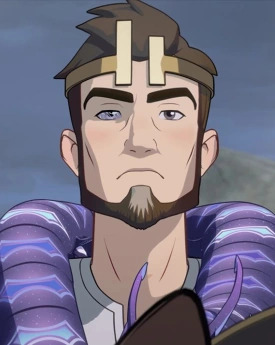

(remember that these characters are fictional and your fellow tumblr users are real. i will block you if you harass others in the notes, please consider sending your unhinged harassment to my inbox instead)
Propaganda under the cut, may contain spoilers:
Viren:
LOVE:
- "power thirsty weasely advisor that ends up mistreating his kids in pursuit of power. my best friends that i watched the show with HATE him for this and frankly it's understandable. he's my meow meow though."
The Light Fury:
HATE:
- "I know many fellow Light Fury haters, especially on Tumblr, but also many passionate defenders, not many neutral or nuanced opinions. But she absolutely deserves to be hated imo because: 1- Her design is full of human gender stereotypes because she's a GIRL dragon so she can't look reptilian and fierce like every other dragon (including every other female dragon in the films like Stormfly and Meatlug) no, she has to be perfectly smooth and have pink fucking glitter on her scales and big blue eyes because she exists for the sole purpose of being Toothless's love interest so she must be as stereotypically feminine as possible. Some people will try to defend this but it's important to understand, she is not real, she did not come into existence naturally or spontaneously, she has no agency... She was purposefully created and designed this way by the (mostly male) filmmakers. Also just because she doesn't have boobs and eyeliner doesn't mean it's not gender roles at all; other characters being worse doesn't make this one above criticism. 2- Somehow, despite looking LESS fierce than literally every other dragon in the film, her alleged purpose for existing is to be "the call of the wild" to lure Toothless away from humankind. She's only on-screen for less than 10 minutes of the entire movie, and she honestly doesn't act particularly respectful or caring to Toothless, and yet he's willing to immediately, permanently abandon Hiccup (his best friend/platonic life partner/platonic soulmate of 5 years) because this girl dragon he JUST met is pretty. (He also forces every other dragon to abandon their human friends too, because he's the "alpha" and can force them to do so.) I'm not anti-romance but I really hate when movies send the message that romance should take priority over all other forms of love, that it's acceptable or even necessary to abandon your friends once you get into a relationship. The Light Fury exists solely to push that idea. 3- The filmmakers didn't even give her name. Allegedly this is to represent how "wild and free" she is, but her offspring all get names despite being just as wild, so... Almost as if she's a completely 1-dimensional plot device rather than an actual character."
#poll#round 2#viren#tdp viren#the dragon prince#light fury#the light fury#httyd#how to train your dragon#how to train you dragon: the hidden world#1 submission
30 notes
·
View notes
Note
A general problem the MCU has is that while they may be good at bringing up potentially interesting and complex takes on real-world issues or things that could shake up the status quo, they're not good at commitment, and usually have the issues get solved in anticlimactic fashion, whether that be by the end of the same project they were introduced in, or have them get solved offscreen.
Like, with The Falcon and the Winter Soldier, they raise a legitimate issue through bringing up the topic of how immigrants and refugees are treated. Setting aside Karli falling into the same trap as Killmonger of "villains who suddenly kill a bunch of innocent people at random because they were raising too many legitimate points, and we need the audience to not root for the", the issue is resolved through Sam effectively giving a "Do better" speech to the politicians while the deportation issue is solved offscreen.
Setting aside that they come off more like a HYDRA manifesto, the Sokovia Accords could've been the foundation for a discussion about acceptable forms of oversight for superheroes. But it really just amounted to a plot device to allow the airport battle to happen, they're pretty much forgotten once Zemo enters the picture, they're mentioned a few times in Ant-Man and the Wasp and WandaVision, and then Matt Murdock's scenes in She-Hulk: Attorney at Law reveal that the Accords were repealed offscreen.
Secret Invasion seemed to be on track to deconstruct Fury's habit of using superpowered people to help him, by having it reveal that he basically exploited alien refugees. But he doesn't actually solve that issue by the end (in fact, when it comes to defeating Gravik, he exploits G'iah having superpowers and wanting to avenge her parents to utilize her as an assassin).
I very much agree with you.
The MCU likes to bring up certain points of discussion but they seem to believe that either the audience is too stupid to understand complex storylines or they just want something easy to digest that won't upset anybody (mostly the execs).
It comes to show that while in the past the superhero movies were all about celebrating the heroes and their "otherness", nowadays we get organizations like the TVA justified by the narrative, the governments are protected and the blame is deflected towards the heroes like Bucky, or a series that could have made a fantastic story regarding Fury, Shield and their shady missions turns out to say... absolutely nothing at all.
What they did to the Flagsmashers and Karli was so utterly disgusting that I can't even begin to say how mad it made me. Hell, Secret Invasion was dealing with refugees as well (the alien-kind but, still). So why not try to connect the two somehow? We had Nick speak to Talos about racism, much in the way Sam gets to mention some of it especially when he's with Isaiah, but nothing ever comes out of it. They're short lines that can be quoted in tweets and memes but they're pointless when it comes to the story being told in the series.
And maybe that's the problem, it would seem that's all Marvel wants. It's like their "queer rep". They want something quick, short, and ambiguous that won't bother anyone too much. Probably because they're one of those who think "both sides" are equally right and wrong and so they don't want to alienate anybody.
And one of the reasons I hate this is that when it really comes to it... does the existence of heroes really change anything in the MCU universe? When it comes to external threats they're essential, but with internal affairs? They always stop the immediate threat but everything else that made it happen is left as it is (the worst offender is CW, the Accords and that damn Raft. "Oh let me break my teammates out of here but watch as I do nothing to help the other inmates or anybody else that will be sent here in the future". WTF is that?!!).
54 notes
·
View notes
Text
so, in my previous post, i mentioned the 13th doctor comic...

i said this comic didn't get it completely right because this one seems to think that the problem is that the doctor couldn't see martha was in love with him and he should adjusted his behaviour accordingly because of it.
the problem here is that he should have treated her with some respect regardless of her feelings, romantic or platonic. it implies if martha didn't have feelings for him, his behaviour that series would have been totally fine.
martha's feelings are a plot device. the unrequited love is a plot device. and the more i rewatch series 3, i can see it's purpose, at least in my opinion. it serves only serve to highlight just how bad the doctor is actually being.
if martha didn't have feelings for the doctor, his behaviour that series would have still been cold, rude and downright mean sometimes. it just hits the viewer harder when you remember the romance. it's one thing to see the doctor swoop martha up in a hug in one moment and drop her in the next, proclaiming that he shouldn't have hugged her because it was a waste of time because something unexpected happened (the elevator) it's another to know that he did this to someone who was crushing - hard, on him.
now, i know that most lines towards martha where he is being mean and insenstive are, mostly, outwards statements towards himself. it's like he forgets that he is talking to a real person. martha says it's like he's looking through her at times. she is a mirror, that reflects his self back to him but also what he has lost. she's like the mirror of erised. it's why we get lines like: "see! never waste time on a hug!"
56 notes
·
View notes
Text
Character Study: Tommy Hagan as Iago from Othello
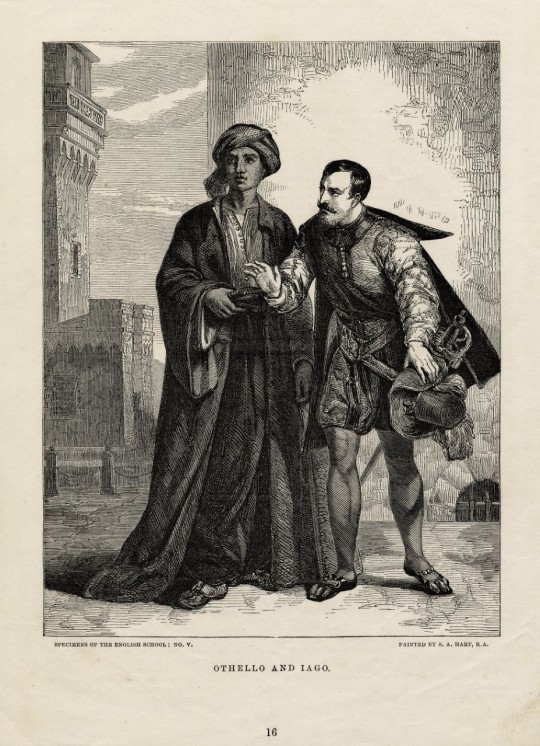
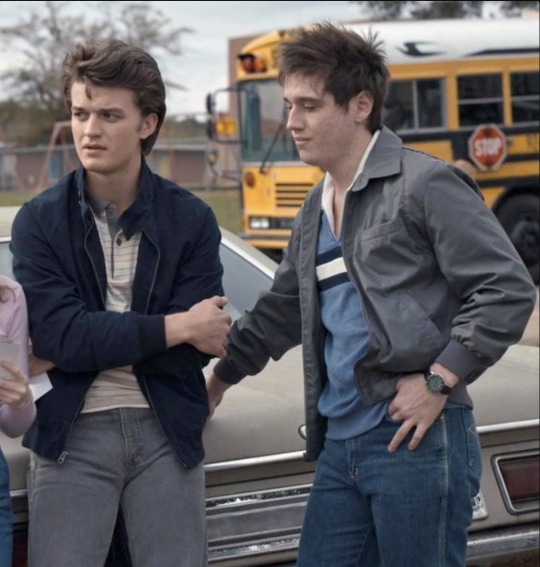
To begin with, there’s just not enough analysis of Tommy, which is probably mostly due to his complete disappearance in S2. We (fic writers) use him a lot as a plot device for Steve’s King persona or the beginning of his bi-awakening, but Tommy’s presence in the show alone is arguably more sinister than most people give him credit for. He’s still a plot device for Steve, but the same way that Iago is a plot device for Othello.
For those who hear “Iago” and think of the bird in Aladdin, that’s totally valid because the Shakespeare character is 100% the influence for that bird, so if that connection helps the rest of this make sense, hang on to it.
Iago (the character and the bird) gets by on feeding Othello information. His job at the beginning of the play is the banner holder, he follows Othello around with his flag. He wanted second in command, but that job went to Cassio instead. This is kind of where Iago’s character development begins: he was snubbed for second in command, and decides quickly that he needs to do away with Cassio, feeding Othello lies until he believes Iago is a better choice.
In the same vein, Tommy has inserted himself as Steve’s right-hand man. That’s what we see from the literal beginning, Tommy following along with Steve as this second-in-command type of person. We don’t really know if there was a Cassio-esque change over with Steve since he just kind of “pops up out of the pool fully formed” (thank you @peter-pantomime for that), but Iago traveled to Venice with Othello to begin with, was always kind of there regardless, so it’s safe to say that Tommy was too. However, like with Iago, Tommy seems to be the real thoughts behind the operation while Steve is the voice that everyone hears. Tommy is, for all intents and purposes, the bird on Steve’s shoulder. Tommy is the puppet master that gives Steve just enough leeway to think he’s the one calling the shots. This is seen in particular with the spray paint incident, since it’s Tommy who’s literally shown with the spray paint can in his hand in the alley, and can be assumed to be the one who tagged the marquee, but Steve is the one who (however unintentionally) takes responsibility for it by doubling down on the accusation.
On that note, the other person Iago goes after is Desdemona, Othello’s wife. Immediately after Othello and Des are married, Iago is the one who tells her father, painting it as this desecration of his pure (white) daughter by this dark (black) [for lack of a better word] creature. It’s Iago’s idea to frame Desdemona as an adultress that ultimately ends in her death.
If we look at those ideas with Tommy, from the get go he (and Carol) are rude and distancing of Nancy, and while Steve is walking this tightrope of wanting to be seen as the top dog while also being whatever Nancy needs him to be, Tommy (and Carol) are causing problems on purpose. Don’t get me wrong, Jonathan and the secret camera incident don’t help, but ultimately it’s Tommy who whispers the thoughts into Steve’s brain about Nancy being a cheater (she was, at least emotionally, but that’s neither here nor there for this comparison) that ultimately leads to the first big breakup. The “death” of Desdemona plays out in the S1 breakup of Steve and Nancy, especially since their reconciliation is never solidified given Nancy’s withdrawal quickly after.
But what the heck is the motive for any of it?
We (Shakespeare people) know Iago has this weird desire for power without seeming to want anything to do with actually wielding it at the forefront. He seems perfectly content to have power over others in the most conniving of ways, but never an “I want to be king” sort of way. Tommy has that same energy, following Steve until it stops being convenient and then moving on to Billy when he “usurps the throne.”
But it’s this weird, intentional isolating of Steve for Tommy’s benefit that mirrors Iago’s intentions with Othello so well. This whole “if I can’t have him, nobody can” sort of attitude that leads both Iago and Tommy to push back against anyone who gets too close to their focus of attention. It’s a jealousy aspect, not in the sense that Tommy/Iago want to be Steve/Othello, but that they’re the only one allowed to be in that position of proximity to them. Tommy/Iago’s entire thing is shifting attention away from themselves while maintaining all of the power. Iago does it with Cassio, using him as the scapegoat in his plan against Desdemona, two birds with one stone. Tommy does it with Jonathan, using him to convince Steve that Nancy really is the slut he accuses her of being. Basically, the moment Steve sees (or thinks he sees) Jonathan with Nancy in her bedroom and misreads the situation just enough to convince him of her cheating is the equivalent to the handkerchief in Othello.
It also sort of begs the question of whether Iago or Tommy have done this in the past. Is Nancy the first girl Tommy’s actively caused an issue with, or does he do this regularly? Is it because Nancy is the first person Tommy doesn’t feel like he can manipulate, thereby labeling her a threat to his power the same way Iago does with Desdemona?
There’s a surface-level (heterosexual) reading of Othello that makes it seem like Iago wants Desdemona for himself, which sure, the fact he’s already married to Emilia while contriving this entire scheme intended to break up Othello and Desdemona can be read as a parallel to Tommy’s relationship with Carol and focus on ending Steve and Nancy’s relationship. But going back to the “If I can’t have him, nobody can” idea, it’s more likely that Tommy and Iago are dealing with this unrequited love situation with their respective male subjects that results in not only a desire for power but this obsessive need to isolate them so that the only person they feel they can rely on is already perched on their shoulder at all times.
Spoiler alert, though, Iago dies, and while Tommy just kind of disappears into the ether, that final scene where Steve finally stands up for himself and cuts ties with Tommy is not entirely unlike Othello finally realizing who Iago really is and killing him himself. The death of the friendship reads like the death of the partnership in both cases. Tommy only just makes it one step further than Iago by attaching himself to the next person in line which is Billy, but there’s no telling if Tommy wouldn’t have done the same manipulative technique with him given the chance. It's also an interesting character development parallel for Steve since him standing up to Tommy can be viewed as the "death" of his King Steve persona more than Billy's introduction can, and Othello's last stand before his death is to make sure Iago goes down as well.
Obviously none of this is good, but Tommy doesn’t really get the credit he deserves for being, for all intents and purposes, a poster child for the Shakespearean villain. All of his sinisterness exists in the background, but it’s definitely there.
33 notes
·
View notes
Text
CC3... and just my problems with sjm as a whole.
Soooooo, yeah. that was a bit disappointing. I wanna start off that due to the problematic nature of SJM I wanna make it clear I no longer financially support her. When I first began reading her books I was in high school and didn't know much about whose books I was reading. Most of it was just pick up a book, read the summary, if I liked it I bought it. But now as an adult who is on booktok and all the other bullshit (it's a whole mess) I can see all of a book and author's pros and cons and be like, "nah, I'm not doing that." And you know as a black woman, I cannot just be and do what I want and damn whoever it may impact or the consequence. I don't get to live in that world. I feel like I have somewhat of a responsibility to not contribute to the harm that the world already does to marginalized people around the world. That's just me personally, black people are not a monolith and this way of thinking doesn't apply to all of us.
Anyway all that being said, I am a book reader who is invested in whatever story they are reading and want to know what happens. So I read CC3.., but was sailing the high seas while I did it if you know what I mean. And let me just say... yikes. The problematic things that SJM does in real life and all that those issues mean really do shine in this book. I mean I always knew white authors have different experiences than me so I don't expect something that caters to me when I read their books but, idk sjm makes all the problematic things just so apparent. And it's just generally hard to read. There can't be any separation between the art and the artist in this one guys. I'm a political science and history major in real life so I spend my time studying political theory and structures of power in historical contexts. Hopefully, I can work to better understand those structures in our current present and with my intersection of activism (I am very passionate about that in my day-to-day) work to make a better world for marginalized people. So when I read SJM, I see some very troubling themes in her work. Themes that can perpetuate misogyny, racism, and imperialism. And it just makes me queasy reading it. It's not fun for me to read that. The way she used the oppression and discrimination of people as a major plot device, that the heroes have to defeat but in real life be ok with taking a birthright trip is just... a type of cognitive dissonance that I can't even put into words. and don't think I forgot the Breonna Taylor incident that she still has on her Instagram. if you don't know what I'm talking about look it up on TikTok, many black book readers have created multiple videos explaining that whole situation.
Now some people may be like, "What the fuck are you talking about. I don't see any of this." And like that's cool maybe because of what I'm studying I just see it everywhere. But I just have not been able to shake this ickiness in my gut about her work. The most thought-out example of the problematic nature of her work that I have is the description and characterization of the Illyrian people.
Now the way she physically described the illryians is as brown-skinned, with dark hair, and brown or dark eyes. This does put them in a very racially ambiguous position but to describe them as brown-skinned makes me picture brown people who in real life are racially recognized as black and brown people. People apart of brown communities are usually Southeast Asian or Arab people. They are marginalized in real life through various forms of oppression displayed in orientalism perpetuated mostly recently by the United States in the last 30 years (the war on terror, but this behavior goes back so much further). The Illyrian people's cultural characterization coupled with their physical description aligns with the negative aspects of Orientalism. Literally, the illryians are described as "backward", "barbaric", "slow to change", and stuck in timeless, old antiquated traditions that encourage the abuse of women and children. Sjm describes an indigenous people (she makes it clear that the illryians are native to the night court and nowhere else) as "savage" culturally, in their interpersonal relationships, and communally. That is just described as inherent to the people (except for a couple of characters who are "the good ones", or "not like that" and lucky enough to get away). Culturally they are described as being constantly in a state of conflict, preparing for and/or enjoying that conflict. I'm so sorry but that is Orientalism, literally the definition of how Orientalism was used to justify the colonization of the Middle East and parts of Asian during the colonization period and again when the western powers and the United States had a vested interest in interfering politically and economically in the region in the last couple of decades. That same language was used to describe the people of the Middle East and justify their oppression in the West. The exact same words. I did not understand the connection until I took a Middle East: politics and society class about two semesters ago and again that same language was used when we were learning about Orientalism. I went back to read some of acotar again and I saw all of that in relation to the illryians and I was like, "oh, oh no." I really don't know what else to say. To me, the relation is very very clear and makes my stomach just drop when reading it.
And the thing about it is it did not have to be this way, SJM did not have to characterize them like that. There is no real narrative function of this characterization, they are not the bad guys of the story or the main antagonist. In fact, the main characters need them to actually defeat the evil. SJM at the base made an interesting indigenous group of people that could have been a unique culture in her narrative landscape and added to her world-building. Instead, she wrote harmful stereotypes about vaguely racialized, marginalized people that directly mirror a marginalized group of people in the real world. Now was that her intention or just the subconscious influence of Orientalism in our society coming out without her awareness? I mean i cannot confirm from the horse's mouth that this is the case right? She has never actually said this. But her stance on current world events that are happening right (Palestine and Gaza strip) does not give me a lot of hope that she is completely unaware. But either way, this can hurt people in the real world. In the book, because the Illyrians are characterized the way that they are, the main characters are put in a moral position of opposition, that is the the dynamic. And to me, that dynamic is hard to read knowing what I know and what actually happens in real life to people that the Illyrians mirror. it begins to be super easy to just live in that moral opposition that can stripe away people's humanity and value. Azriel's contempt for his people and desire to destroy Illyria and the culture is a good example of what happens to these groups in real life. This is just one example of things in her work that can be problematic.
And listen I'm not writing this to tell you to stop reading her, to tell you what to do with your money, or who to like/support. That is not my job. I just wanted to share some of my thoughts and give whoever is reading this food for thought. And hey I might be reading too much into this, and just going way too deep. It is just hard for me to enjoy her work anymore knowing and seeing what I see. I can't really ignore that icky gut feeling.
And hey do I think sjm is a good writer? Eh... that is a whole other blog post. I could go really deep into her world-building, story choices, and what I think might just be lazy writing. But there are some aspects that I do like and are unique. But guess what? The fandom's fanfic writers are the light in the tunnel in this situation. As they often are in other fandoms. they take the actual cool and fun things that SJM created and build on them in a way that does not negatively depict the representation of real people. In a way that is not narratively disappointing. In a way that is just fun for everyone to enjoy. Free of charge they express their talent because they love to do it for however long they want to. Fanfiction is an amazing system that I hope and pray won't get messed up. Like one of my favorite creators @separatist-apologist posted about last week, "I think no matter what happens, we've all spent so much time reading fic and developing headcanons that whatever SJM does isn't going to live up to the fantasy we've created...". And I for real felt that and I just wanna shout out to all the fic writers who make this space fun despite all the fandom fuckery and SJM fuckery.
@separatist-apologist, @thehaemanthus, @the-lonelybarricade, @moodymelanist, @ablogofsapphicpanic, @vidalinav, @vikingmagic33, @c-e-d-dreamer
There are more that I probably missed. So you know thank you guys for making things fun and giving me something to read that doesn't give me an icky feeling when I read.
So yeah, thank you for coming to my ted talk. this turned out to be hella long but you know once I started I couldn't stop. If you have any questions, my ask box is open. Again these are just my thoughts. you don't have to agree and I'm not trying to change your mind. I just needed to share this somewhere.
#acotar#acotar fanfiction#sjm critical#fanfiction#very scared to how this will be recieved#i might delete idk#acotar fandom#just a thought#black tumblr#black reader#sjm books#sjmaas#cc3#crescent city
26 notes
·
View notes